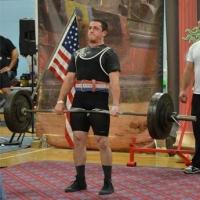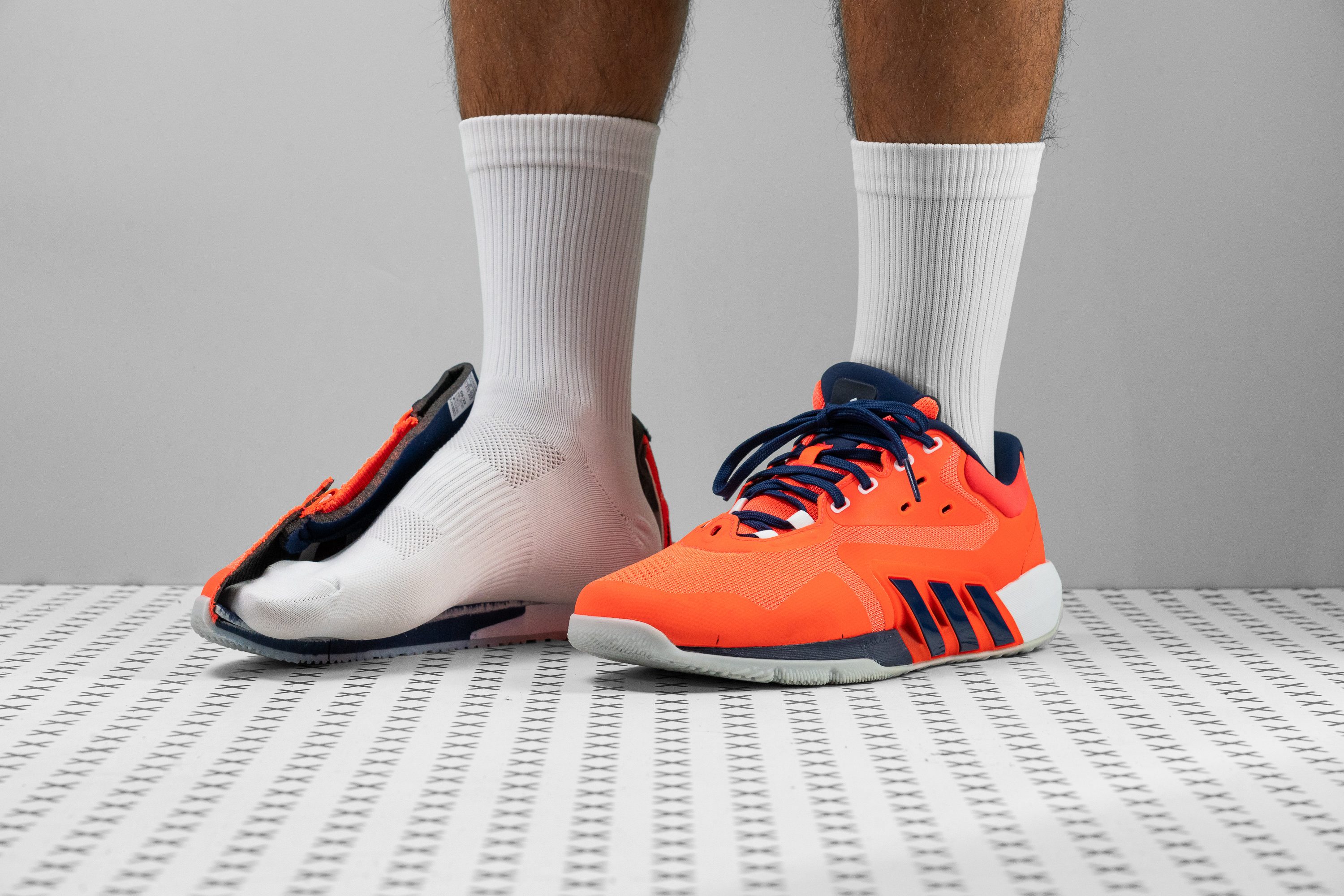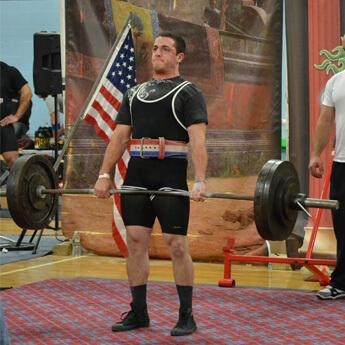Our verdict
- Top pick in best hiit shoes (2023)
Pros
- Balance of ground feel and cushioning
- Very stable platform
- OK for rope jumping
- Comfortable in-shoe feel
- Highly breathable
- Super hard-wearing outsole
- Fairly flexible
- Good grip
- Sustainable materials
Cons
- Poor upper durability
- Pretty heavy
Audience verdict
- Top 21% in training shoes
Comparison
The most similar training shoes compared
+ + Add a shoe | |||||
|---|---|---|---|---|---|
| Audience score | 90 Great! | 90 Great! | 80 Good! | 82 Good! | |
| Price | £120 | £110 | £140 | £150 | |
| Use | CrossfitWorkoutCross-trainingGymHIIT | CrossfitWorkoutCross-trainingGymHIIT | CrossfitWorkoutCross-trainingGym | CrossfitWorkoutCross-trainingGymHIITAll sports | |
| Shock absorption | - | Low | Moderate | Moderate | |
| Energy return | - | Low | Moderate | High | |
| Traction | - | Moderate | High | High | |
| Drop lab | 7.7 mm | 7.8 mm | 9.1 mm | 7.9 mm | |
| Heel stack lab | 24.5 mm | 22.6 mm | 27.7 mm | 25.6 mm | |
| Forefoot | 16.8 mm | 14.8 mm | 18.6 mm | 17.7 mm | |
| Weight lab | 13.5 oz / 383g | 12.1 oz / 343g | 12.1 oz / 344g | 12.5 oz / 353g | |
| Breathability | Breathable | Breathable | Breathable | Warm | |
| Width / fit | Medium | Medium | Wide | Narrow | |
| Toebox width | Narrow | Medium | Wide | Wide | |
| Size | True to size | True to size | Half size small | True to size | |
| Midsole softness | Firm | Firm | Firm | Balanced | |
| Stiffness | Moderate | Moderate | Moderate | Moderate | |
| Torsional rigidity | Stiff | Moderate | Stiff | Moderate | |
| Heel counter stiffness | Moderate | Moderate | Flexible | Moderate | |
| Toebox durability | Bad | Decent | Bad | Good | |
| Heel padding durability | Good | Good | Bad | Good | |
| Outsole durability | Good | Good | Decent | Decent | |
| Midsole width - forefoot | Wide | Very wide | Average | Average | |
| Midsole width - heel | Average | Average | Average | Average | |
| Widths available | Normal | NormalWide | NormalWide | Normal | |
| Insole thickness | Average | Average | Very thick | Average | |
| Outsole thickness | Thick | Average | Average | Average | |
| Outsole hardness | Average | Average | Average | Hard | |
| Heel tab | None | Pull tab | None | Finger loop | |
| Tongue: gusset type | None | Both sides (full) | Both sides (full) | None | |
| Tongue padding | Average | Average | Average | Average | |
| Ranking | #12 Top 23% | #10 Top 28% | #32 Bottom 13% | #30 Bottom 18% | |
| Popularity | #36 Bottom 33% | #8 Top 22% | #31 Bottom 16% | #33 Bottom 10% |
Who should buy
Based on our lab findings and workout sessions, we think that the Adidas Dropset Trainer will please the gymgoers who:
- need an all-purpose training shoe
- do moderate types of workouts
- focus more on lifting than on running in their regimen
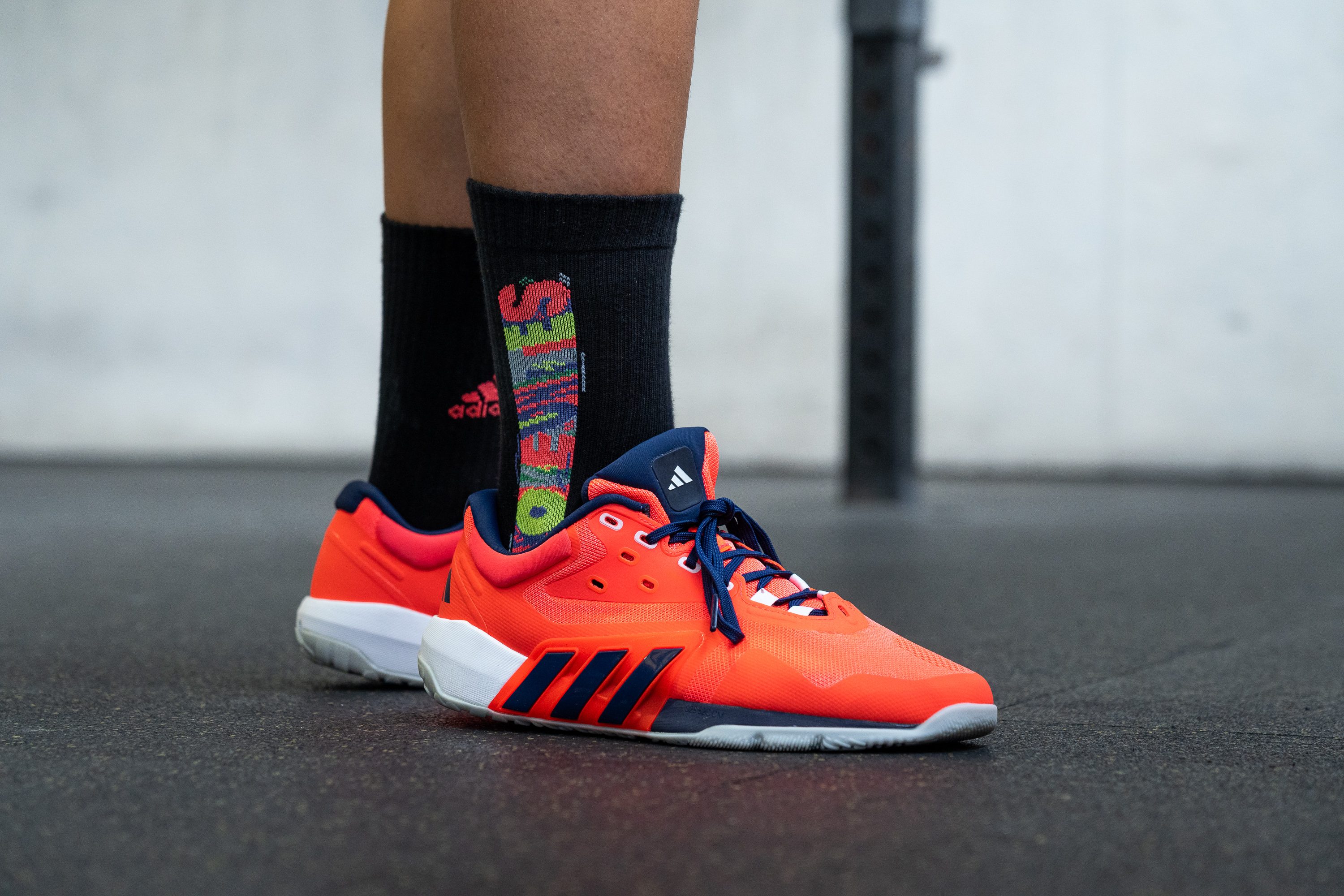
Who should NOT buy
It's a pretty dang heavy trainer! Especially if you are used to the more nimble kind of shoes. In that case, we recommend the Nike Free Metcon 5 instead.
This Adidas gym shoe also lacks wear resistance in the upper which shortens its lifespan significantly and makes it awful for rope climbs. Our top choices for durability are the Nike Metcon 8 or the Reebok Nano X3 instead.
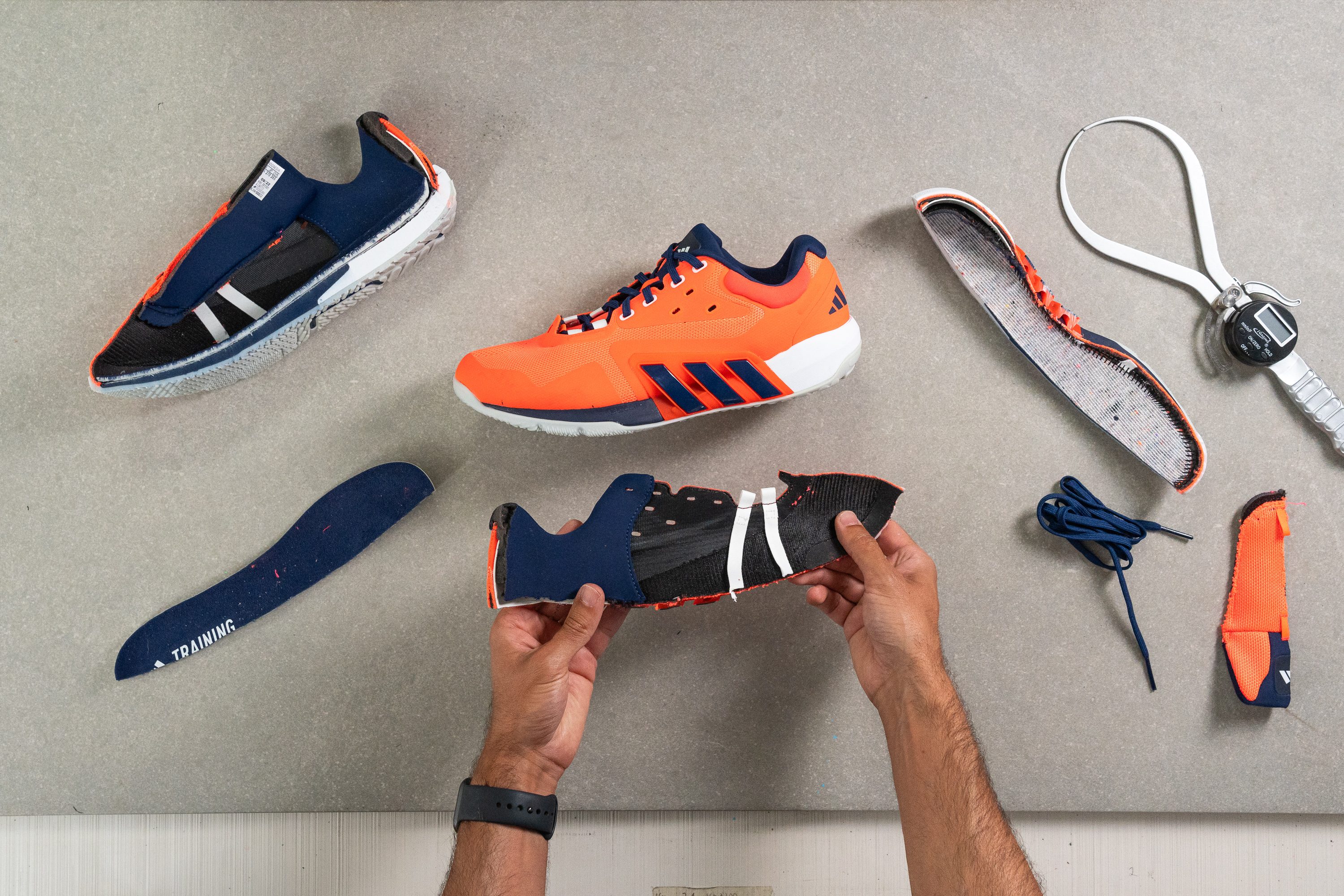
Cushioning
Heel stack
The Dropset Trainer hits a sweet spot with its stack height.
We measured the heel at 24.5 mm, which is the average for training shoes. This is enough cushioning to keep the foot protected for plyometrics while making you feel connected to the ground.
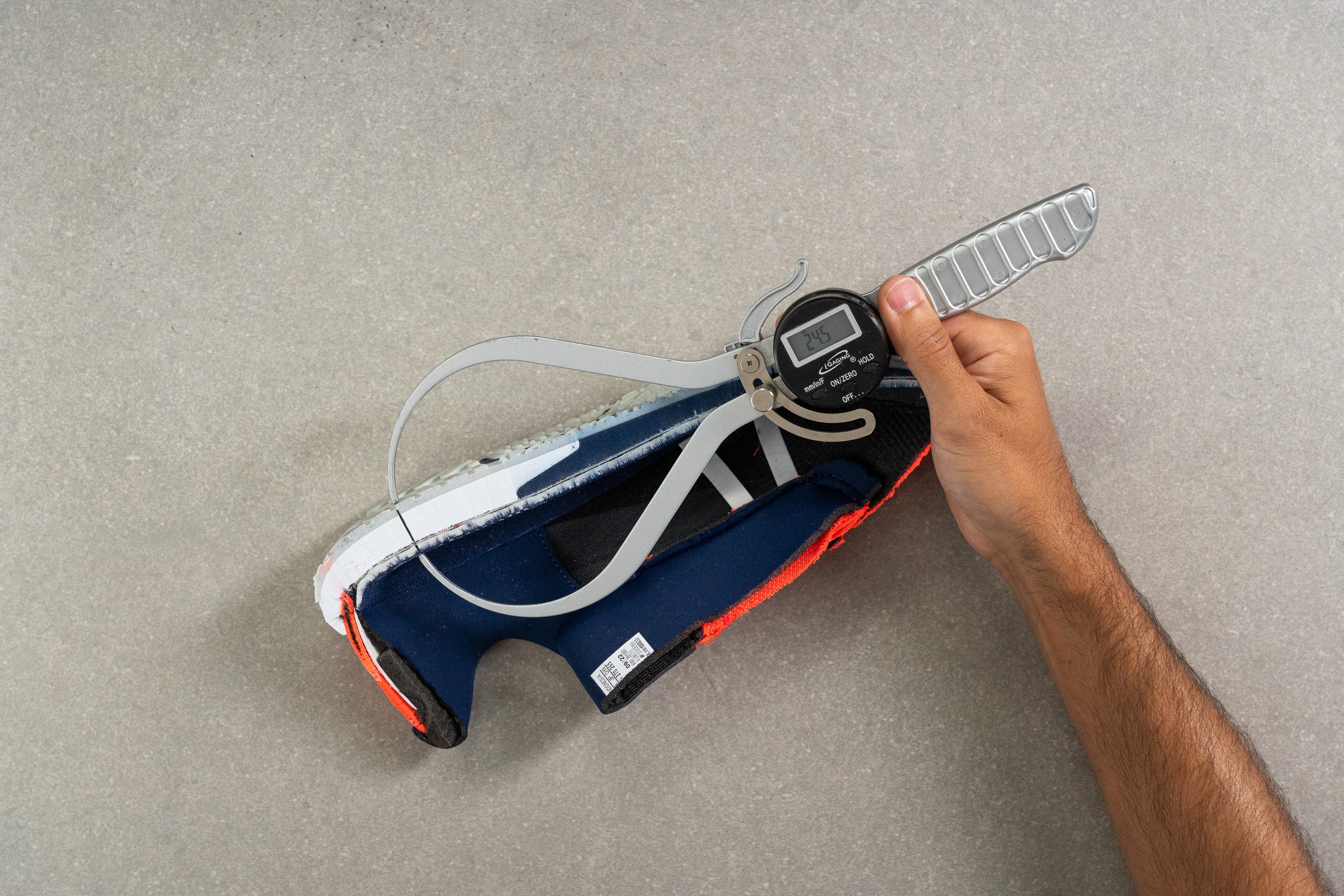
| Dropset Trainer | 24.5 mm |
| Average | 24.3 mm |
Forefoot stack
In the forefoot, the stack height also shows a pretty average result. Our calliper gives a reading of 16.8 mm.
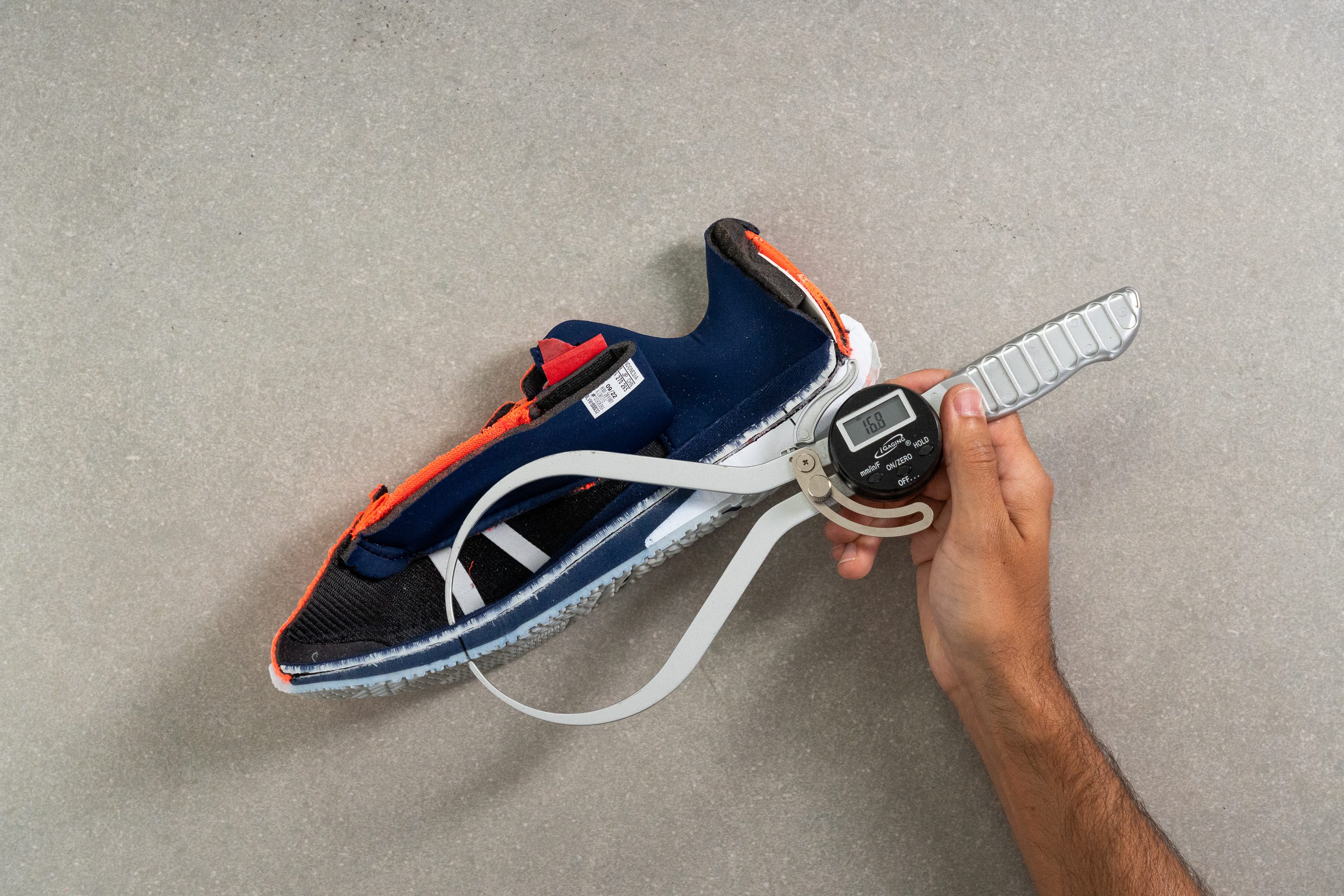
This amount of stack height made us feel very much in control of the movements. It also created a nice buffer when skipping rope.
| Dropset Trainer | 16.8 mm |
| Average | 18.1 mm |
Drop
The brand states that the heel-to-toe drop in this Adidas shoe is 6 mm. However, according to our own measurements, it turned out to be 7.7 mm. This is a bit tall for a cross-training shoe as the typical offset hovers around 4-6 mm.
But we believe that for an average athlete, 8 mm of heel elevation is not going to cause any discomfort. On the contrary, it provides some extra cushioning and benefits the ankle when squatting with weight.
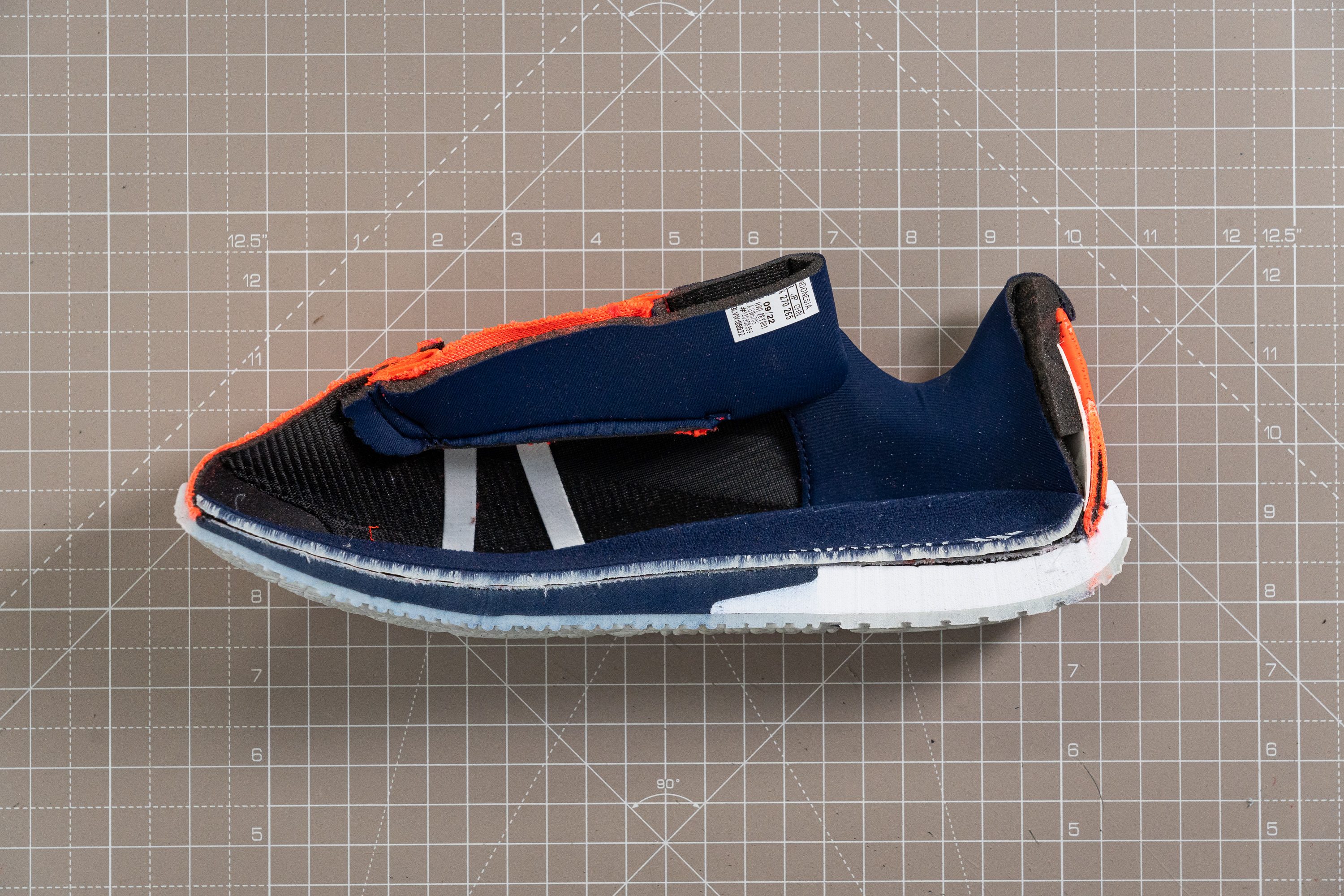
| Dropset Trainer | 7.7 mm |
| Average | 6.3 mm |
Midsole softness
As expected from a proper cross-trainer, the Adidas Dropset comes with a nice and firm heel. This is crucial for keeping the foot planted on the floor when lifting and is also important for overall stability.
Turning to our durometer, we found that it is as firm as 32.8 HA, which is a good 21% firmer than the average!
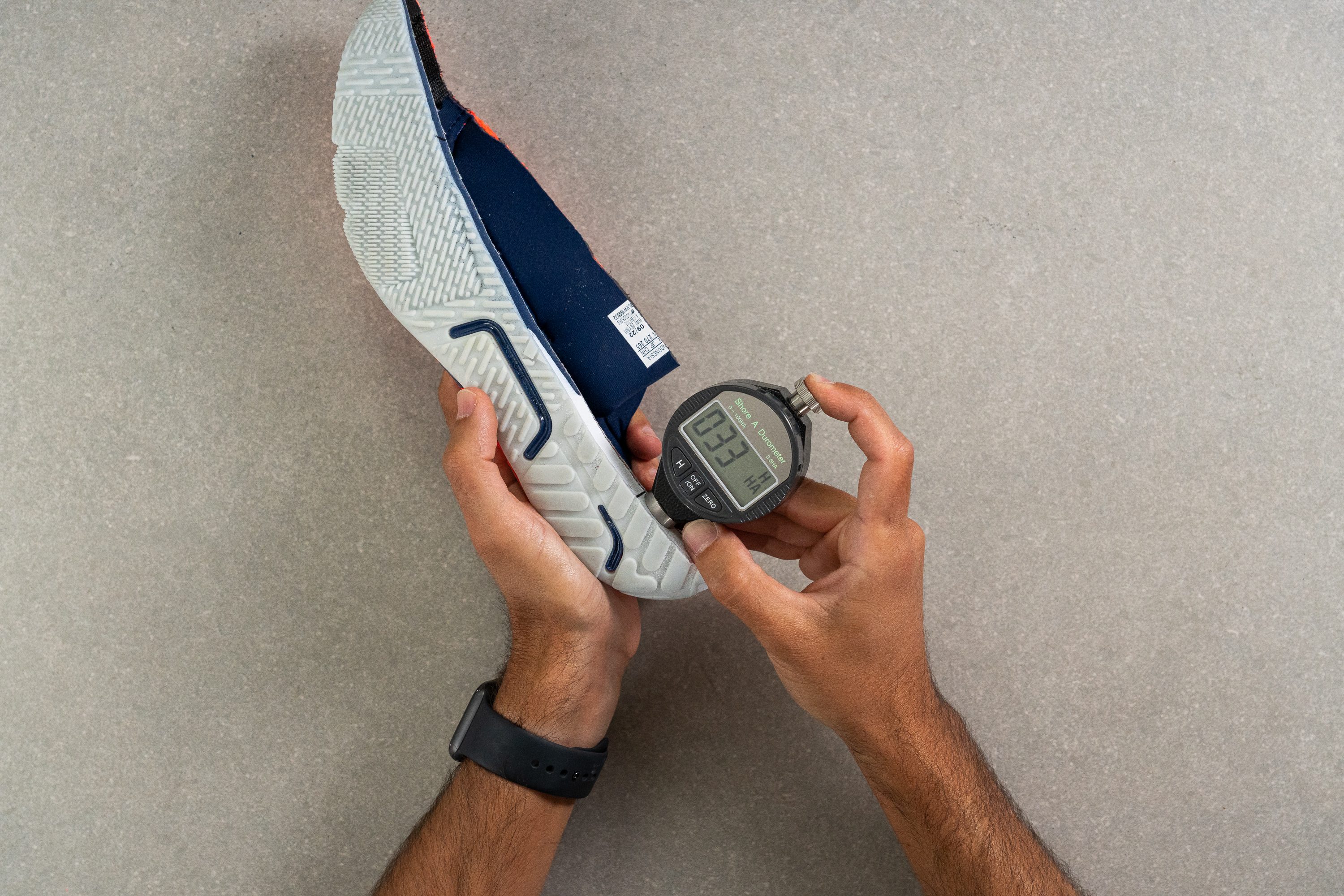
| Dropset Trainer | 32.8 HA |
| Average | 27.8 HA |
Size and fit
Size
Adidas Dropset Trainer fits true to size (11 votes).
Internal length
| Dropset Trainer | 268.6 mm |
| Average | 268.9 mm |
Width / Fit
We used a calliper to measure the shoe's toebox in its widest part. The tool shows 101.4 mm which is exactly the average for training shoes. We consider it a medium toebox.
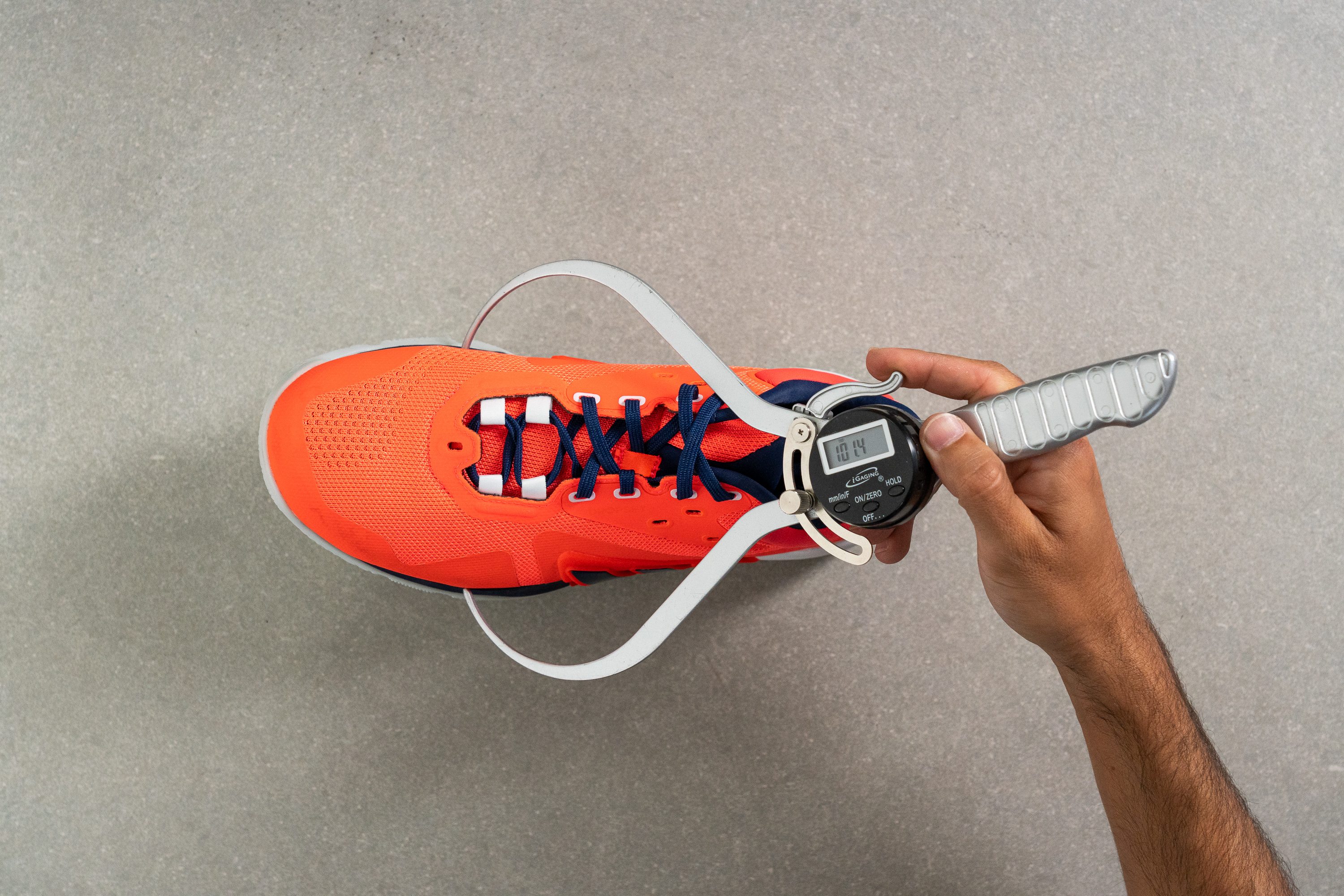
This test follows an older methodology, which is why you don't see recently tested shoes in the chart. Results from different methodologies can not be compared.
| Dropset Trainer | 101.4 mm |
| Average | 100.6 mm |
Toebox width
Repeating the measurement in the narrower part of the toebox (around the big toe), we made sure that the Dropset Trainer doesn't have a pointy shape. As it turns out, it does not.
At 77.1 mm, it is a little bit narrower than the average 79 mm but still within the medium-width range.
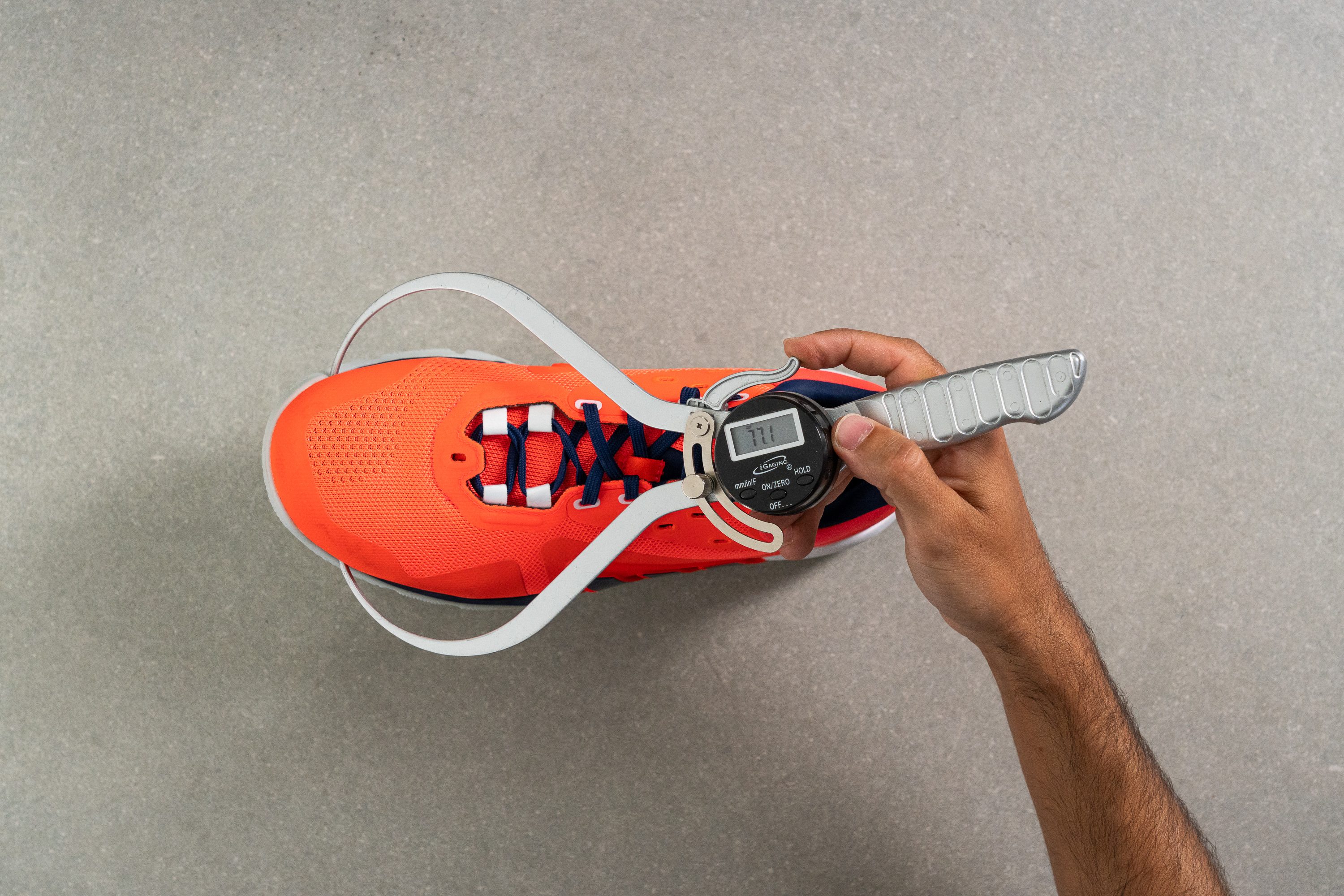
We believe that the Adidas Dropset Trainer works best for people with average-sized feet. Wide footers may want to get half a size larger because the shoe's upper material has absolutely no give.
This test follows an older methodology, which is why you don't see recently tested shoes in the chart. Results from different methodologies can not be compared.
| Dropset Trainer | 77.1 mm |
| Average | 78.8 mm |
Flexibility / Stiffness
We used a gauge to measure how much force it takes to bend the Dropset Trainer to a 90-degree angle. It required 19.3N, which is 17% less than the average. This means that the shoe is more flexible than many other training shoes.
It is not the most pliable one in our lab (think 8.8N of force needed to bend the Nike Free Metcon 5), but we can definitely classify it as flexible.
The shoe is quite forgiving when doing planks, lunges, and burpees, among other exercises where your foot needs to bend.
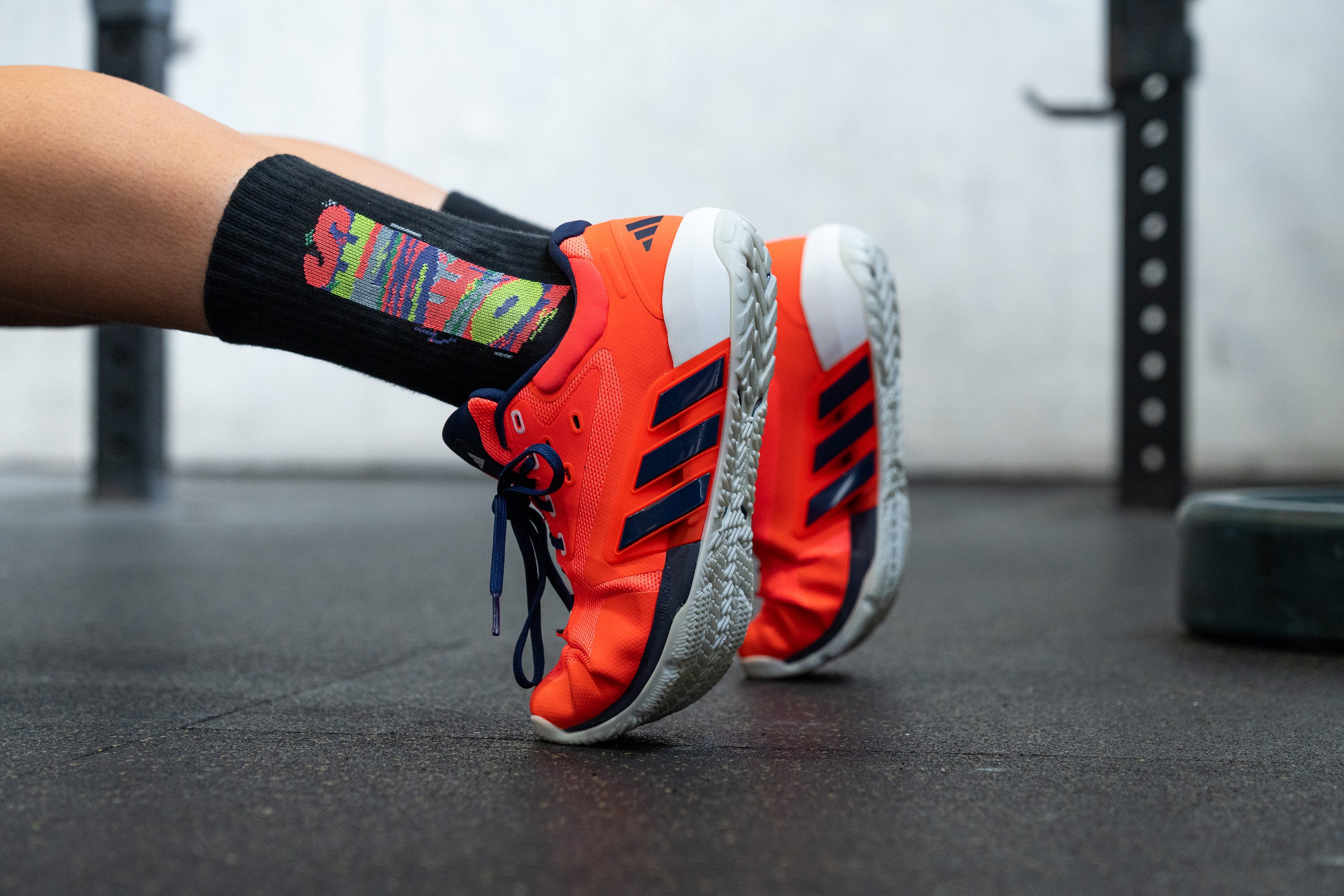
This test follows an older methodology, which is why you don't see recently tested shoes in the chart. Results from different methodologies can not be compared.
| Dropset Trainer | 11.3N |
| Average | 17.7N |
Weight
For a workout shoe, the Adidas Dropset trainer is waaaay heavier than it should be.
Weighing the shoe in a men's US size 9 showed us 13.5 oz (383g) on the scales. That's A LOT compared to the average, which often hovers around 11 oz (312g).
If you mostly focus on weightlifting and strength training, it probably won't be too big of a deal. But for cardio and sprinting, this shoe is too bulky. There is plenty of high-performance trainers out there that are much lighter on the foot including the Nike Metcon 8 and the NOBULL Outwork, among others.
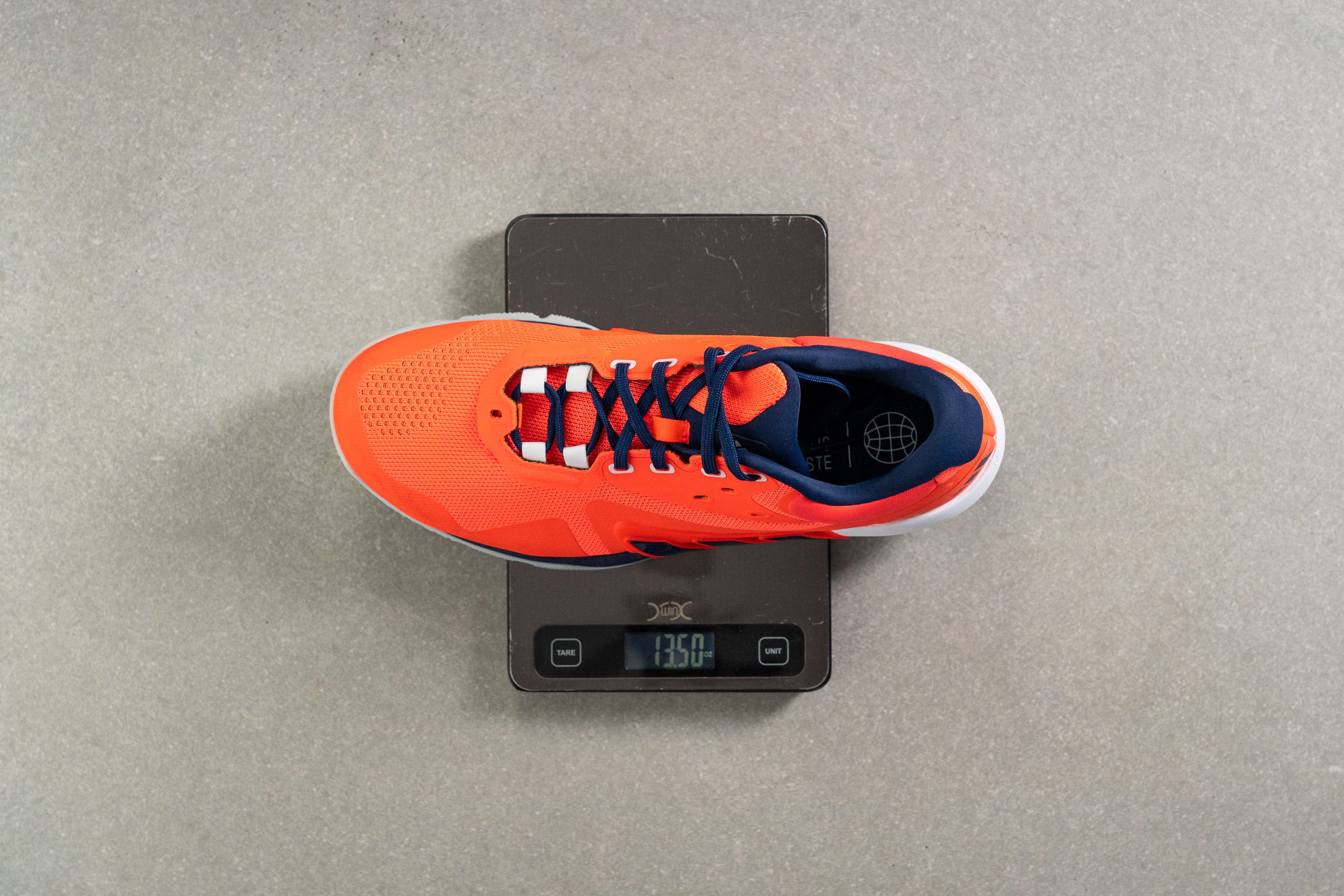
| Dropset Trainer | 13.5 oz (383g) |
| Average | 10.7 oz (304g) |
Breathability
The Dropset Trainer is a lifesaver in a hot gym!
Having tested its breathability with a smoke-pumping machine, we assessed its ventilation capacity as 5 out of 5. That's the highest score in our rating!
This was really surprising given that in our transparency test, we didn't find any visible ventilation pores.
But taking a closer look at the fabric through a microscope, we found that the weave pattern has slightly larger loops in some places.
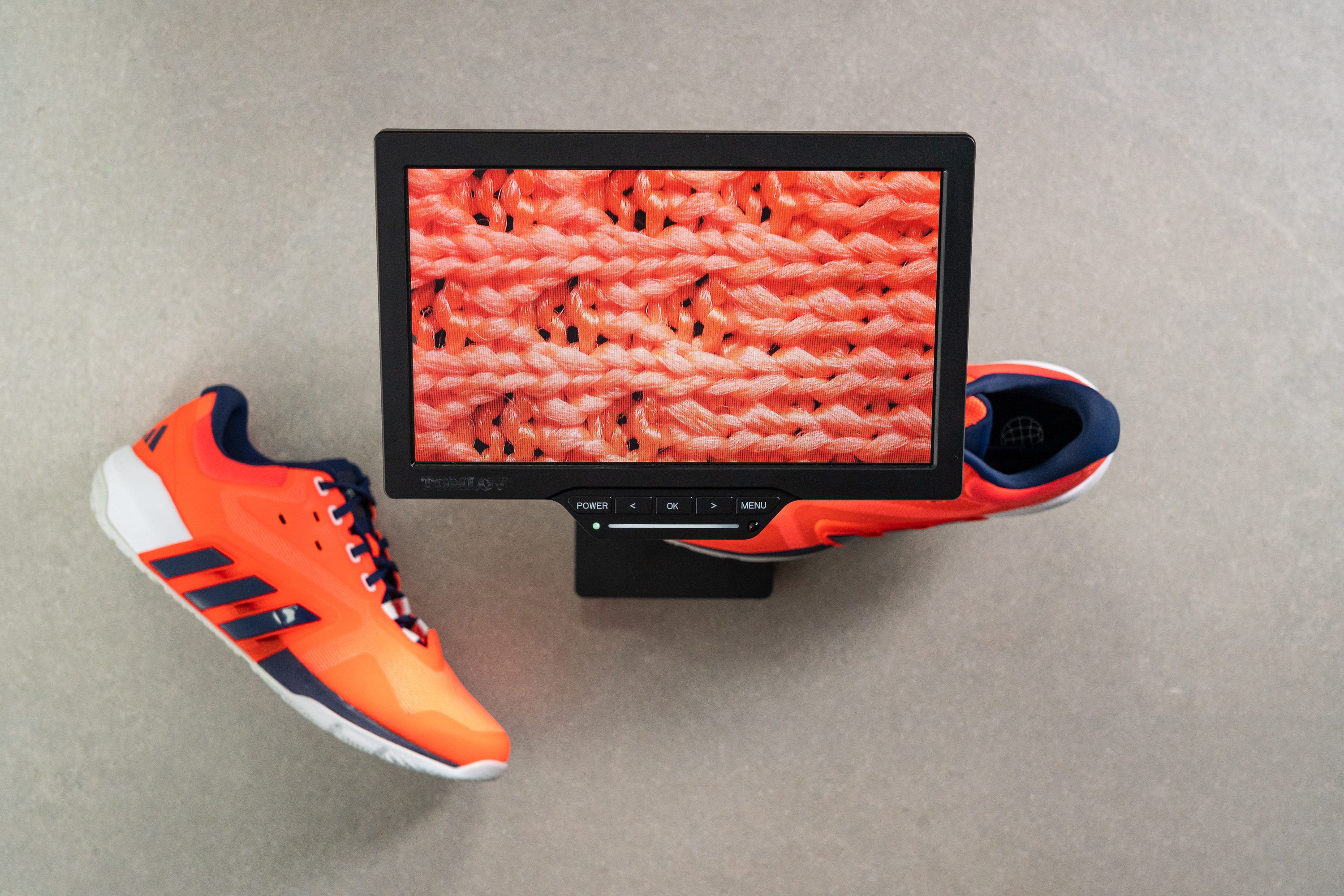
Because there are hundreds of these loops all throughout the fabric, the air has a way to pass through.
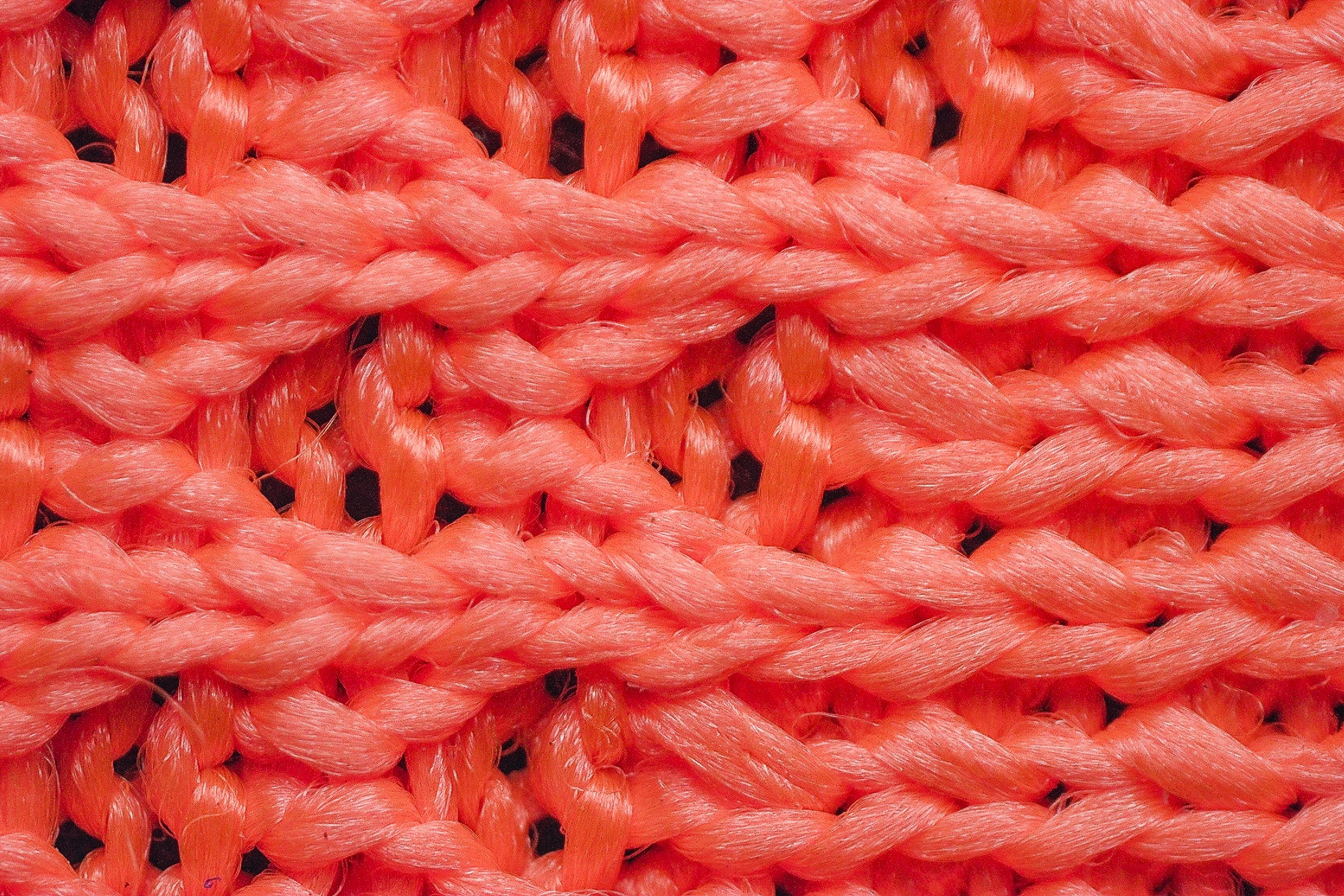
| Dropset Trainer | 5 |
| Average | 3.6 |
Stability
Lateral stability test
Stability is this Adidas shoe's forte.
With its firm heel and overall supportive build, we never felt wobbly or out-of-balance. The shoe made us feel anchored to the floor, especially for the weightlifting portion of the workout.
Torsional rigidity
You can probably tell how rigid the shoe feels in the midfoot by merely looking at its mighty TPU sidewalls.
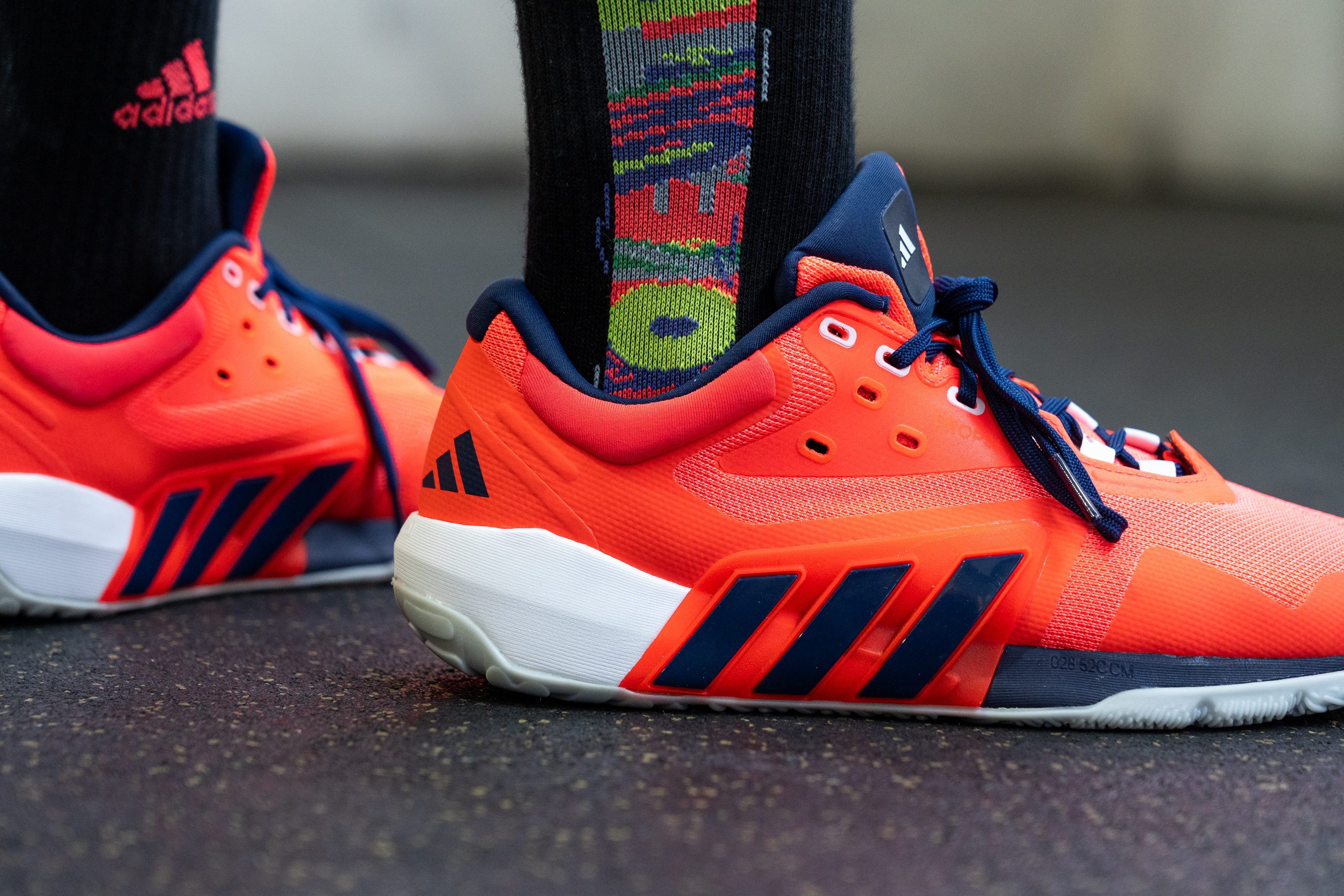
But as a shoe lab, we must put a number on everything. So, in our manual test of the Dropset's torsional rigidity, we rated it as 4 out of 5. It is nearly the stiffest one on our list!
This means that the shoe feels marvellously stable and side-to-side movement of the ankle is nearly zero.
| Dropset Trainer | 4 |
| Average | 2.9 |
Heel counter stiffness
We also found some good stiffness in the shoe's heel counter. After squeezing and pushing this area, we gave it a rating of 3 out of 5. Because it is quite rare to see heel stiffness over 3 in training shoes, the heel clutch of the Dropset Trainer is indeed among the firmest.
This is yet another contributor to the shoe's arch and ankle support as it doesn't let the foot roll inwards uncontrollably. This is especially important for gymgoers with overpronation.
| Dropset Trainer | 3 |
| Average | 2.7 |
Midsole width - forefoot
Adidas gave us a super wide base to lean on in the Dropset Trainer.
We measured the widest part of the forefoot at 115.3 mm, which is around 6 mm wider than the average!
Having a wider landing area under the toes creates a more planted experience but can make you feel less agile. That's why we recommend this Adidas shoe for workouts that focus more on weightlifting rather than quick and shifty exercises with a lot of footwork. If that's what you do, we recommend the Nike Zoom Metcon Turno 2 instead.
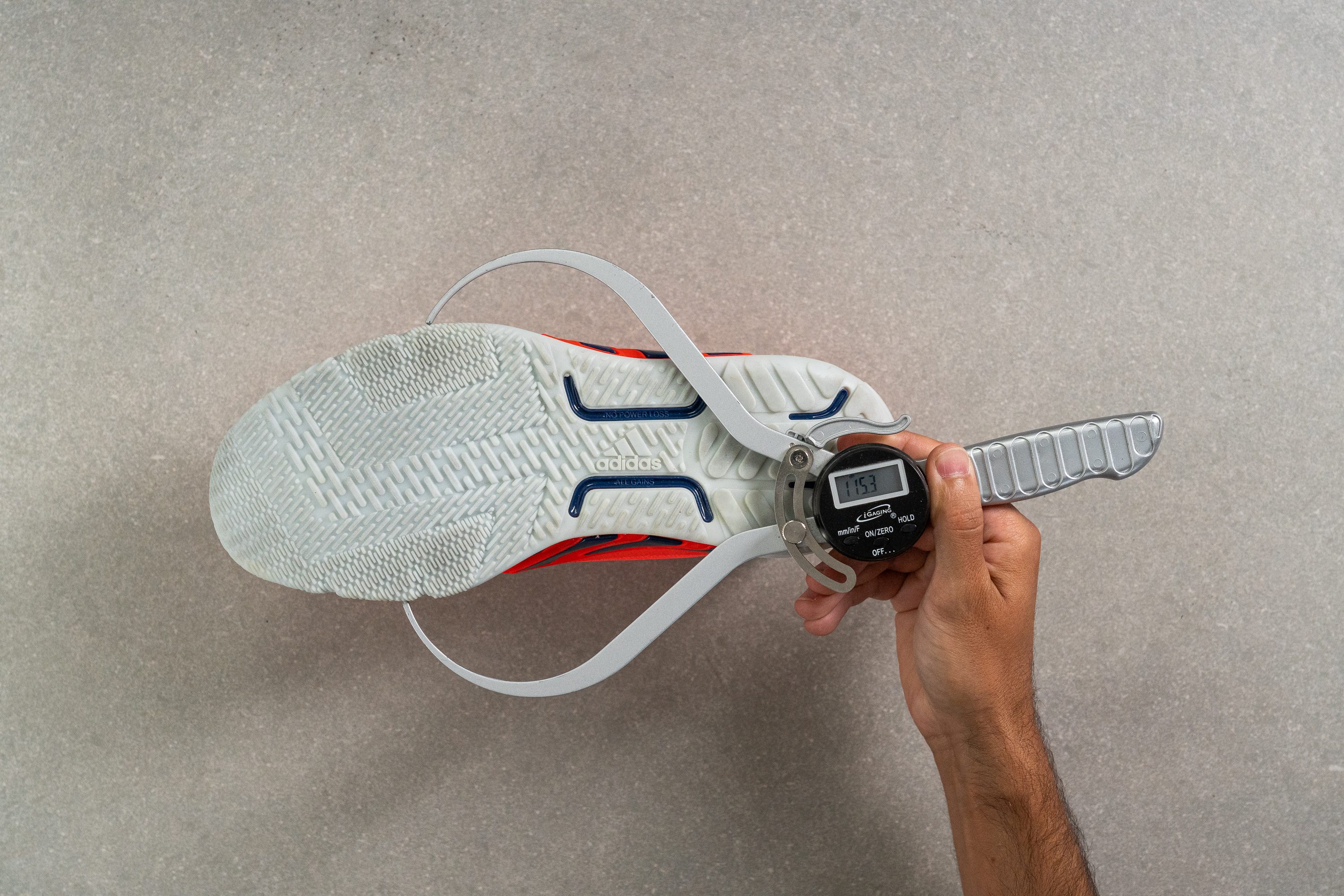
| Dropset Trainer | 115.3 mm |
| Average | 110.9 mm |
Midsole width - heel
Interestingly enough, the heel is not as wide in the Dropset Trainer. Even in the widest part, it comes in at 83.3 mm which is about 4 mm narrower than the average.
We must admit, we never noticed that! Nor was there any lack of stability in the heel because of that. But if you prefer a really wide heel with side flanges for extra support, the Nike Free Metcon 5 (95.1 mm) is hard to beat.
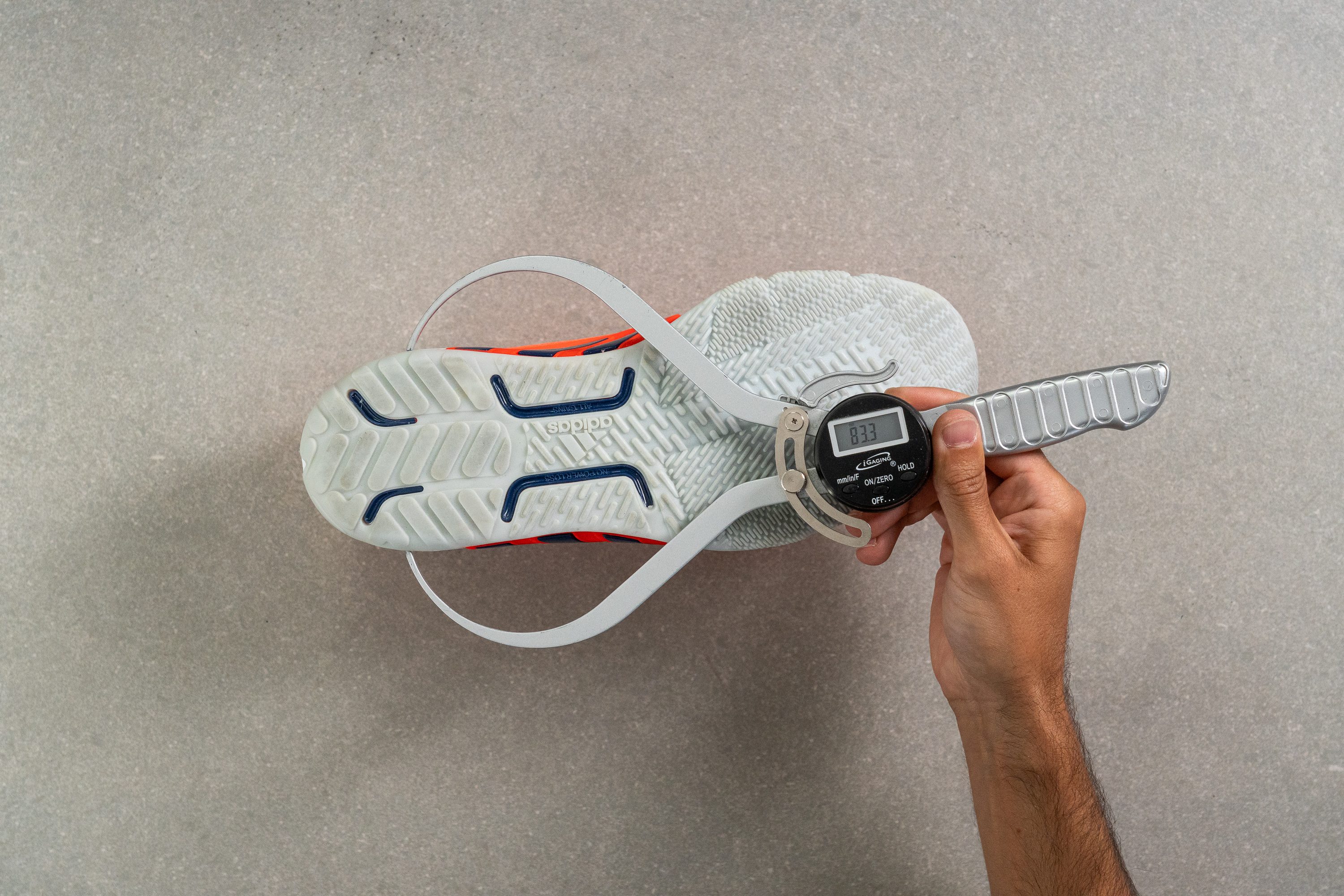
| Dropset Trainer | 83.3 mm |
| Average | 86.9 mm |
Durability
Toebox durability
Sadly, this airy knit upper didn't hold up to our durability test. Our Dremel left a see-through hole in the toebox after only four seconds of drilling.
We had to rate the shoe's toebox durability with the lowest score of 1 out of 5. Rope climbs and other potentially abrasive exercises are a big no-no for this shoe.
For comparison, here is what the toebox on the Reebok Nano X3 looks like after the same test.
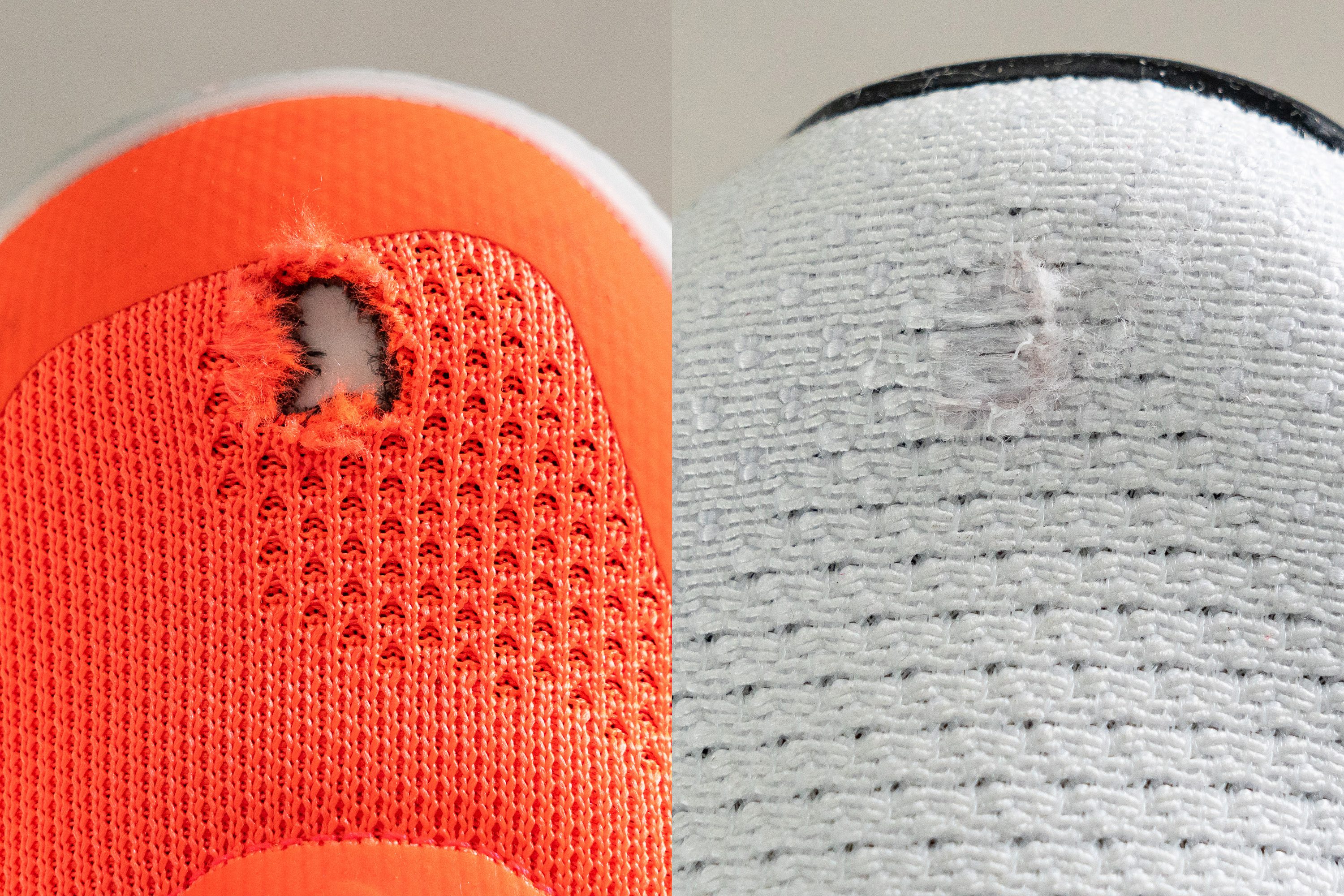
| Dropset Trainer | 1 |
| Average | 2.7 |
Heel padding durability
The heel padding, on the other hand, did much better under the same Dremel test. In this part, the Dropset Trainer deserves a solid 5 out of 5.
For reference, here is what happened to the Nike Zoom Metcon Turbo 2 in the exact same conditions (4 seconds of drilling with a 3.2N force at 10K RPM speed).
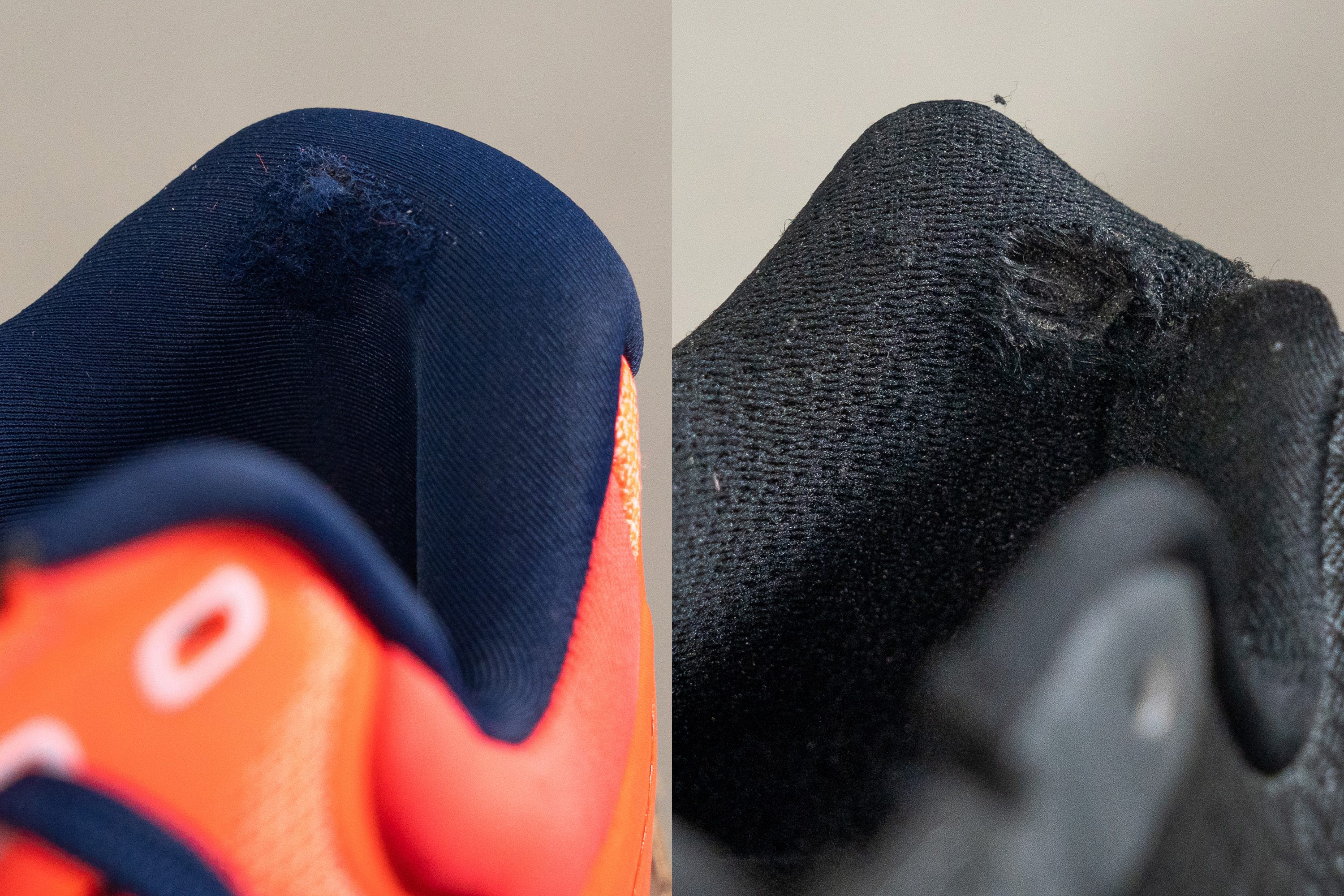
| Dropset Trainer | 5 |
| Average | 2.9 |
Outsole hardness
The shoe's outsole also showed phenomenal results in all three of our durability tests.
First of all, it is very hard. Pressing our durometer against the rubber returned a reading of 85.3 HC, which is a bit harder than the average. We anticipate that a harder rubber like that won't be quick to wear out.
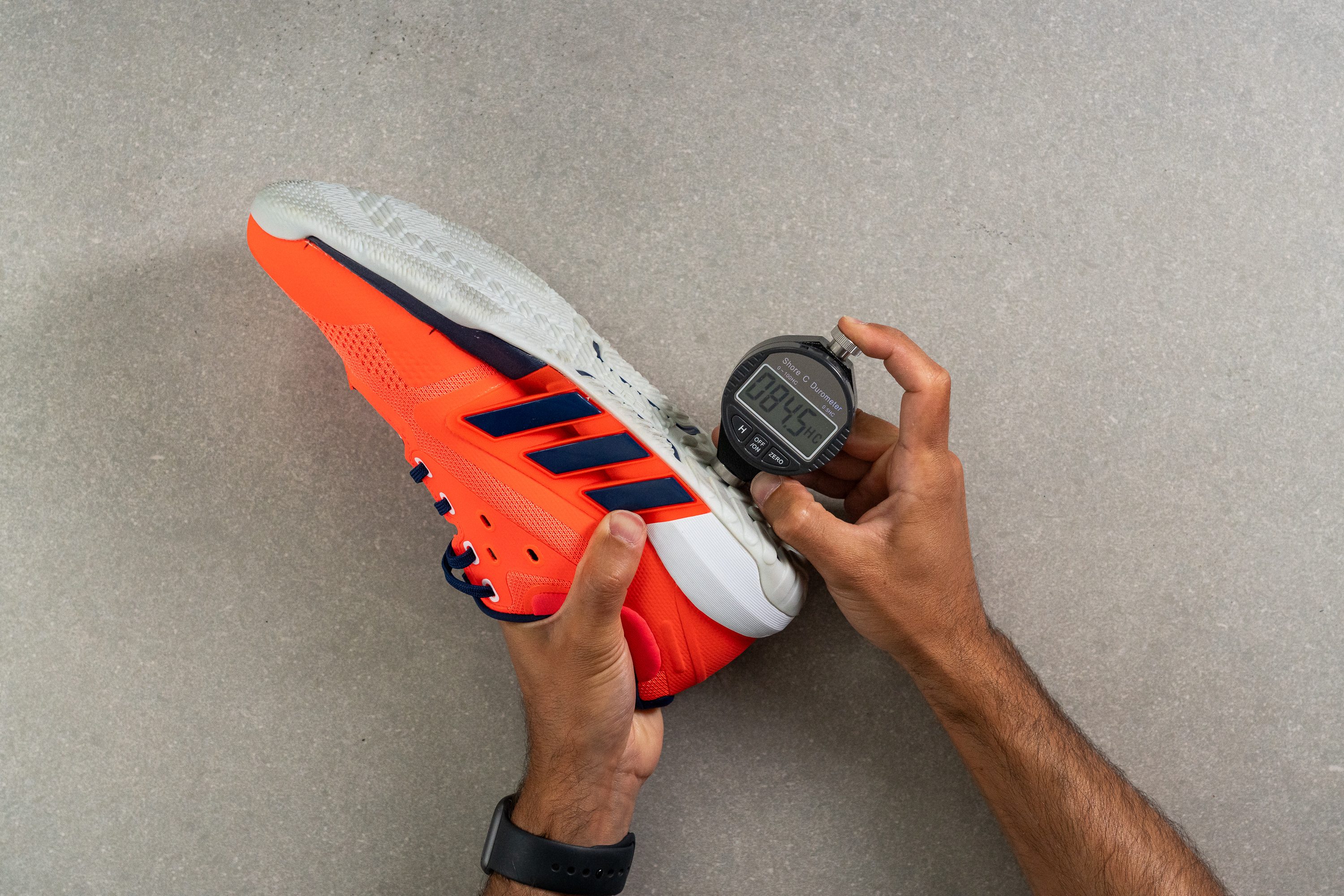
| Dropset Trainer | 85.3 HC |
| Average | 83.2 HC |
Outsole durability
Applying a Dremel against the shoe's outsole literally left us speechless.
Even 22 seconds of drilling couldn't damage the rubber that much!
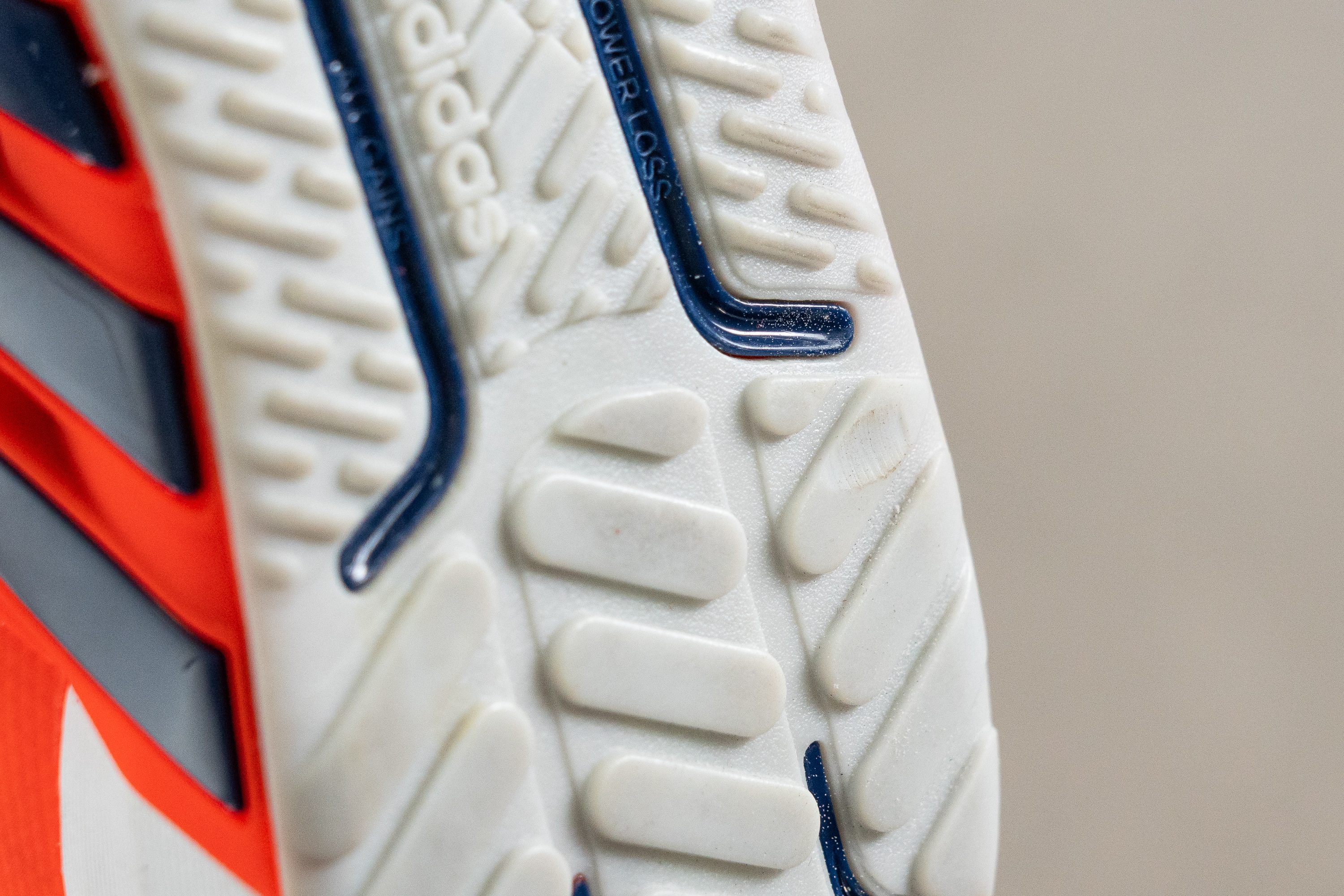
Measuring the depth of the dent, it was as little as 0.4 mm! This is nothing compared to the average 1 mm of damage received by training shoes on average.
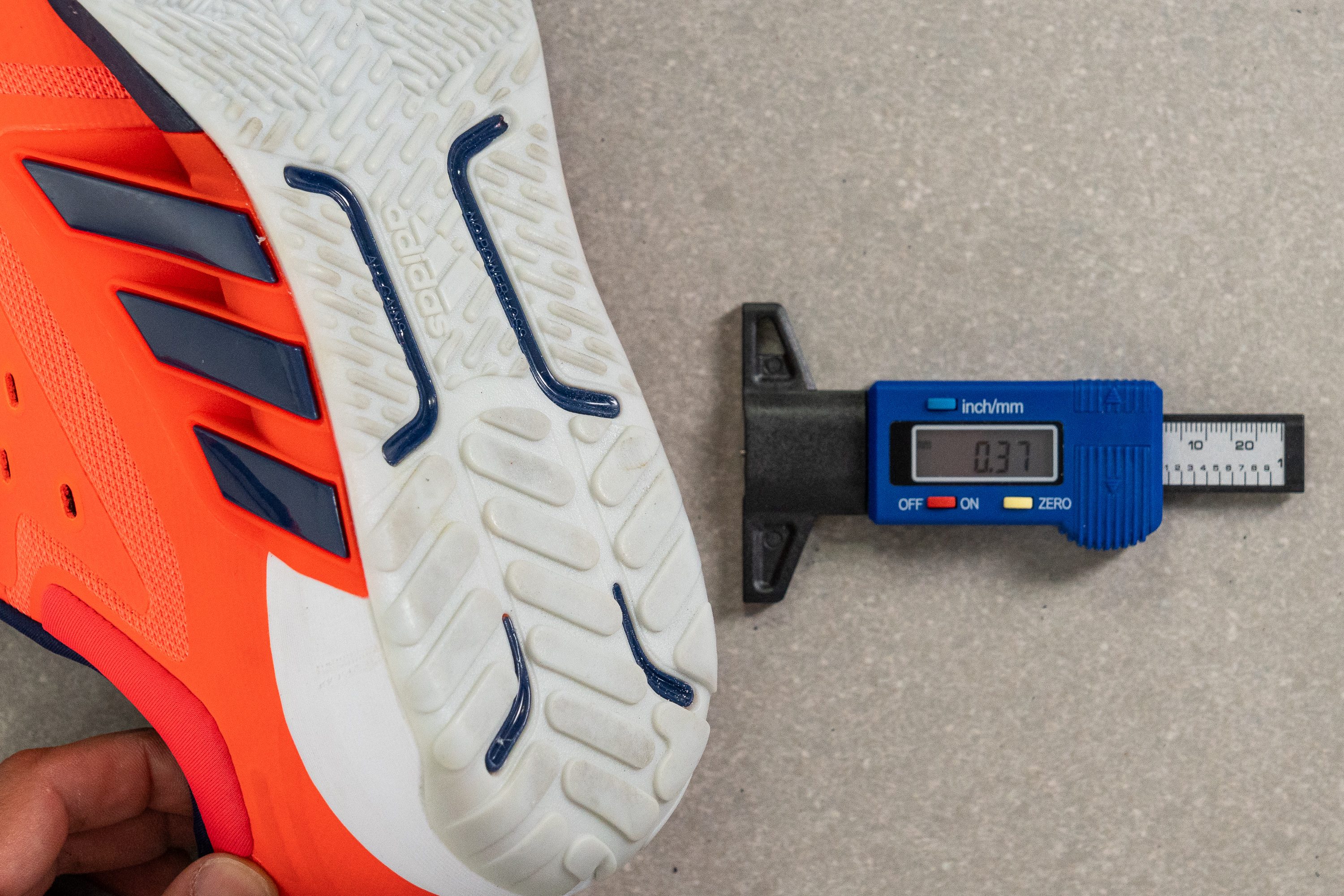
| Dropset Trainer | 0.4 mm |
| Average | 1.1 mm |
Outsole thickness
Having a thick layer of rubber also plays a part in the shoe's durability.
Our calliper shows that the outsole is 4.7 mm thick, which is almost a whole millimetre thicker than the average!
We must say, the outsole of this Adidas trainer will outlast its upper for sure.
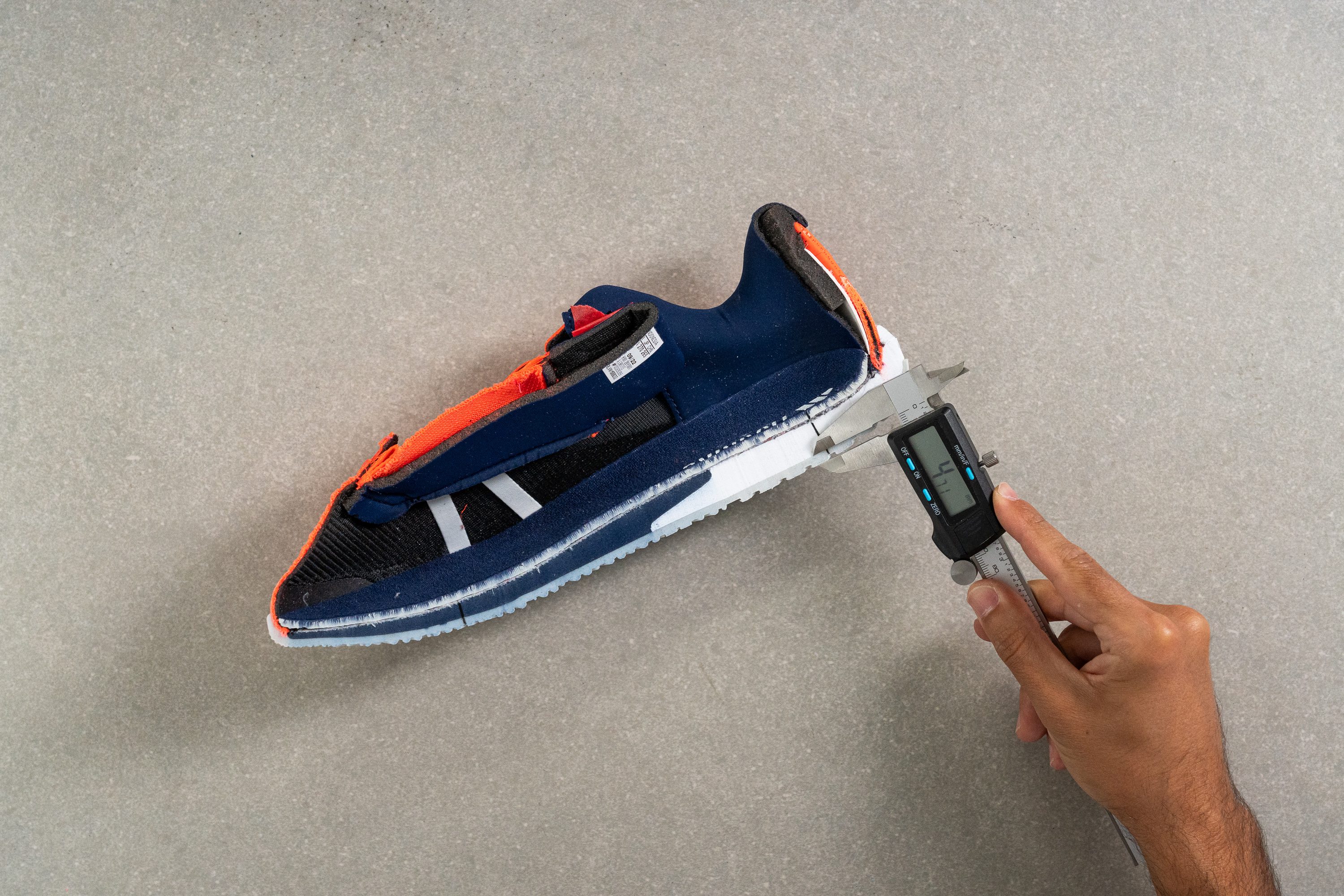
| Dropset Trainer | 4.7 mm |
| Average | 3.6 mm |
Misc
Insole thickness
Extra underfoot padding is provided by an insole. We measured it at 4.3 mm which is a little thicker than the average.
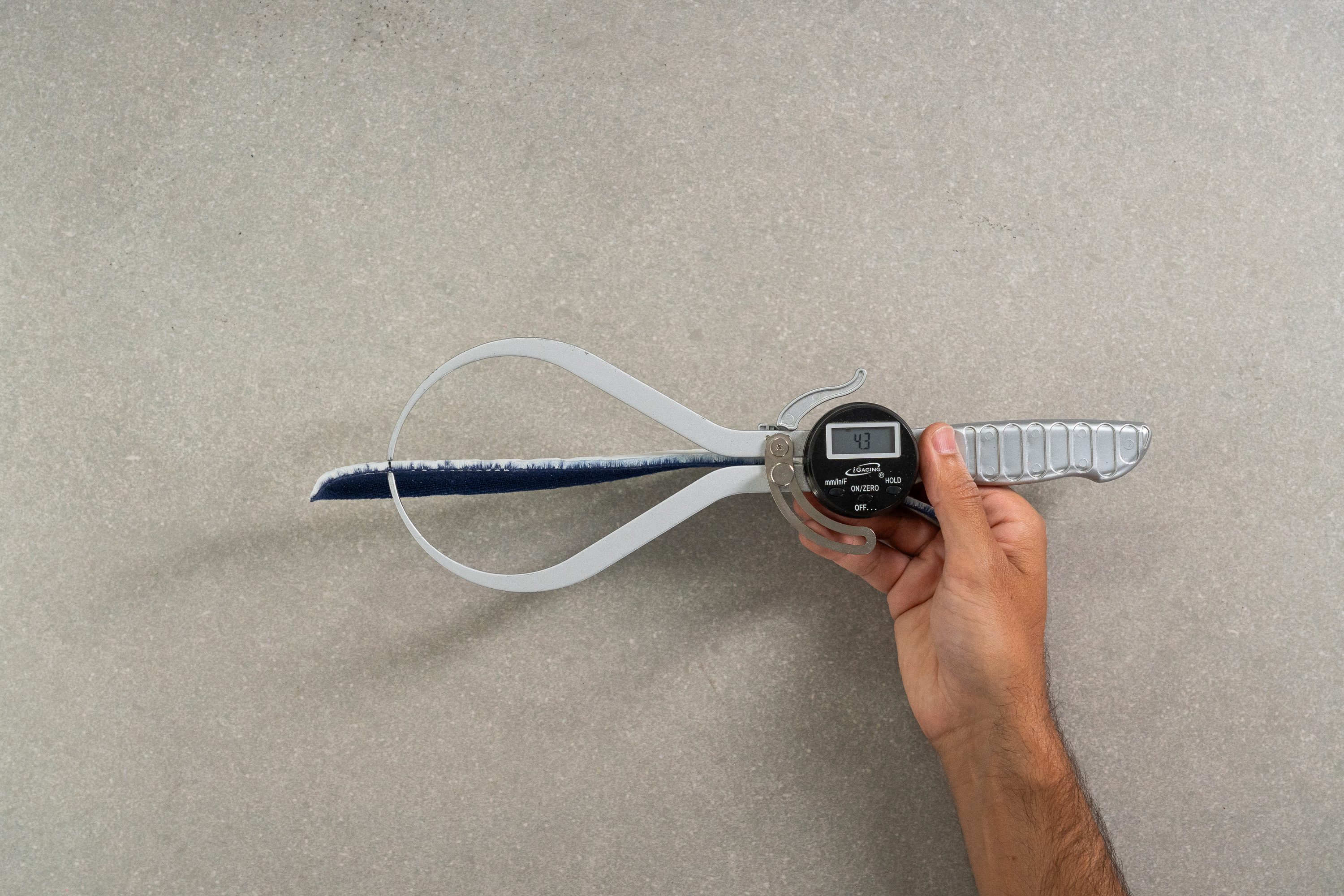
| Dropset Trainer | 4.3 mm |
| Average | 4.0 mm |
Removable insole
The shoe's removable insole allows you to customise the underfoot experience as you wish. Whether it's for more cushioning, less cushioning, or extra arch support, it is up to you.
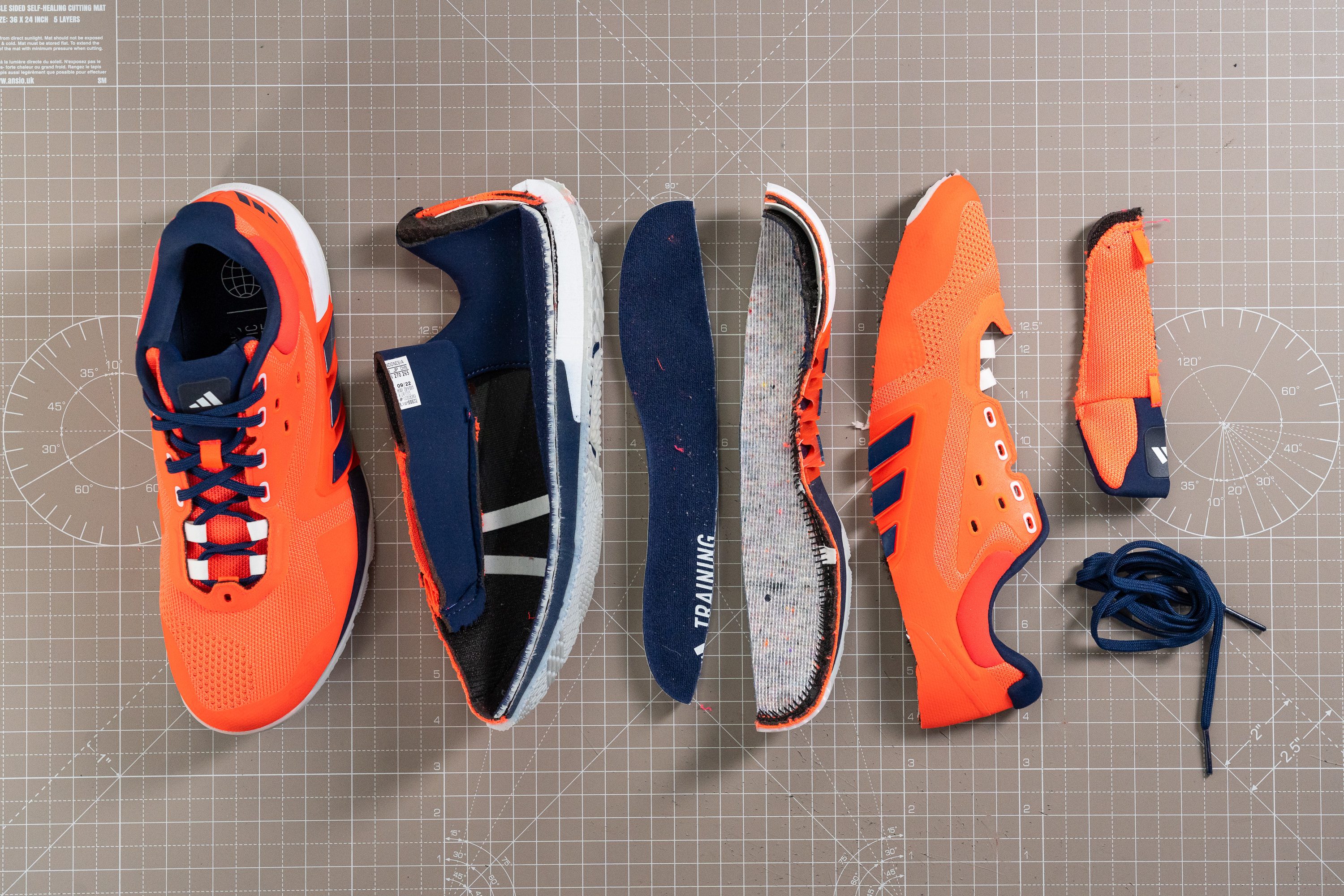
| Dropset Trainer | Yes |
Reflective elements
As a nice bonus, the overlay around the eyelets is made of reflective material.
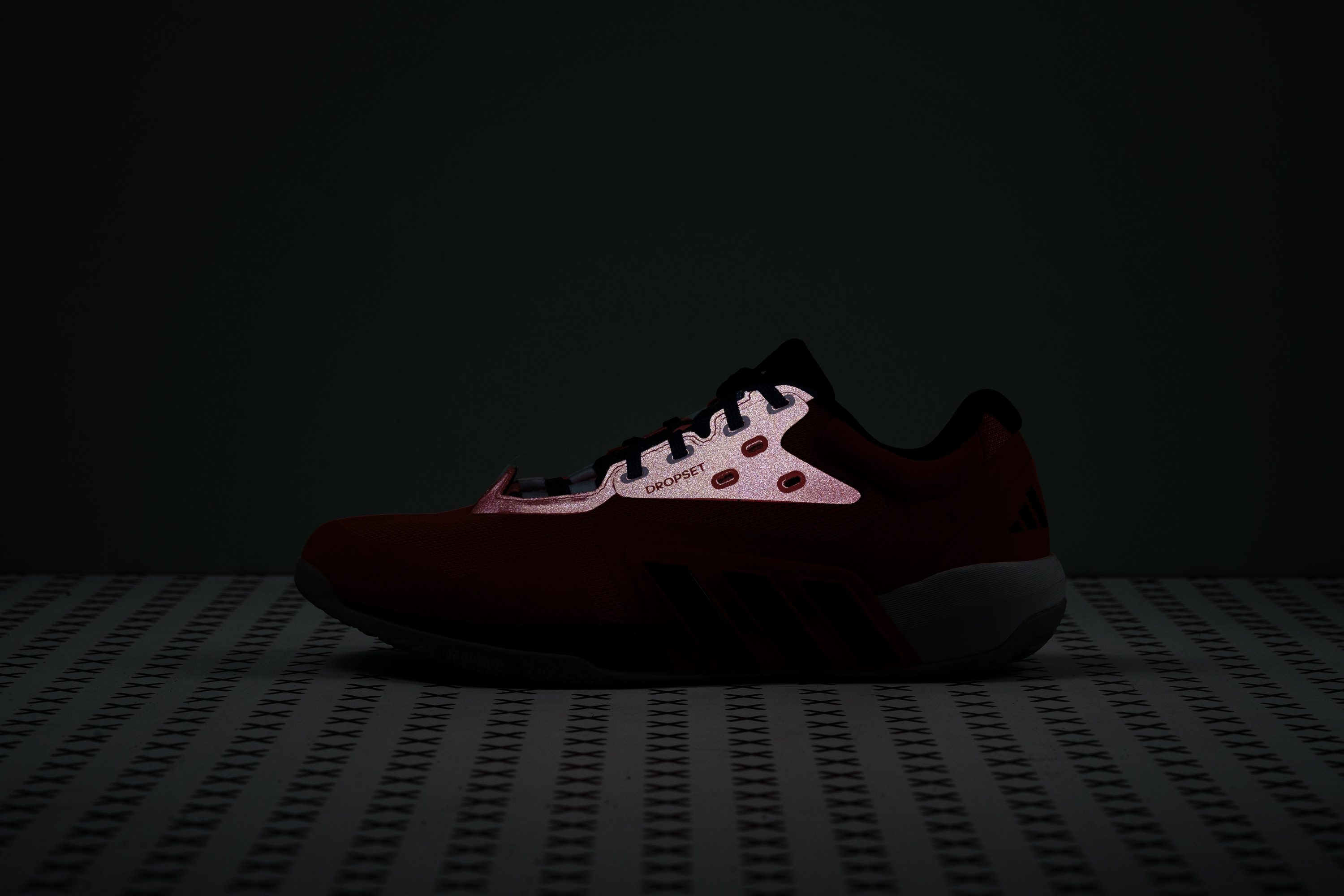
| Dropset Trainer | Yes |
Tongue padding
The shoe has a rather generously padded tongue. At 7.2 mm, it is thicker than the average by more than a millimetre.
Combined with the equally padded collar, it created an amazing in-shoe feel for us.
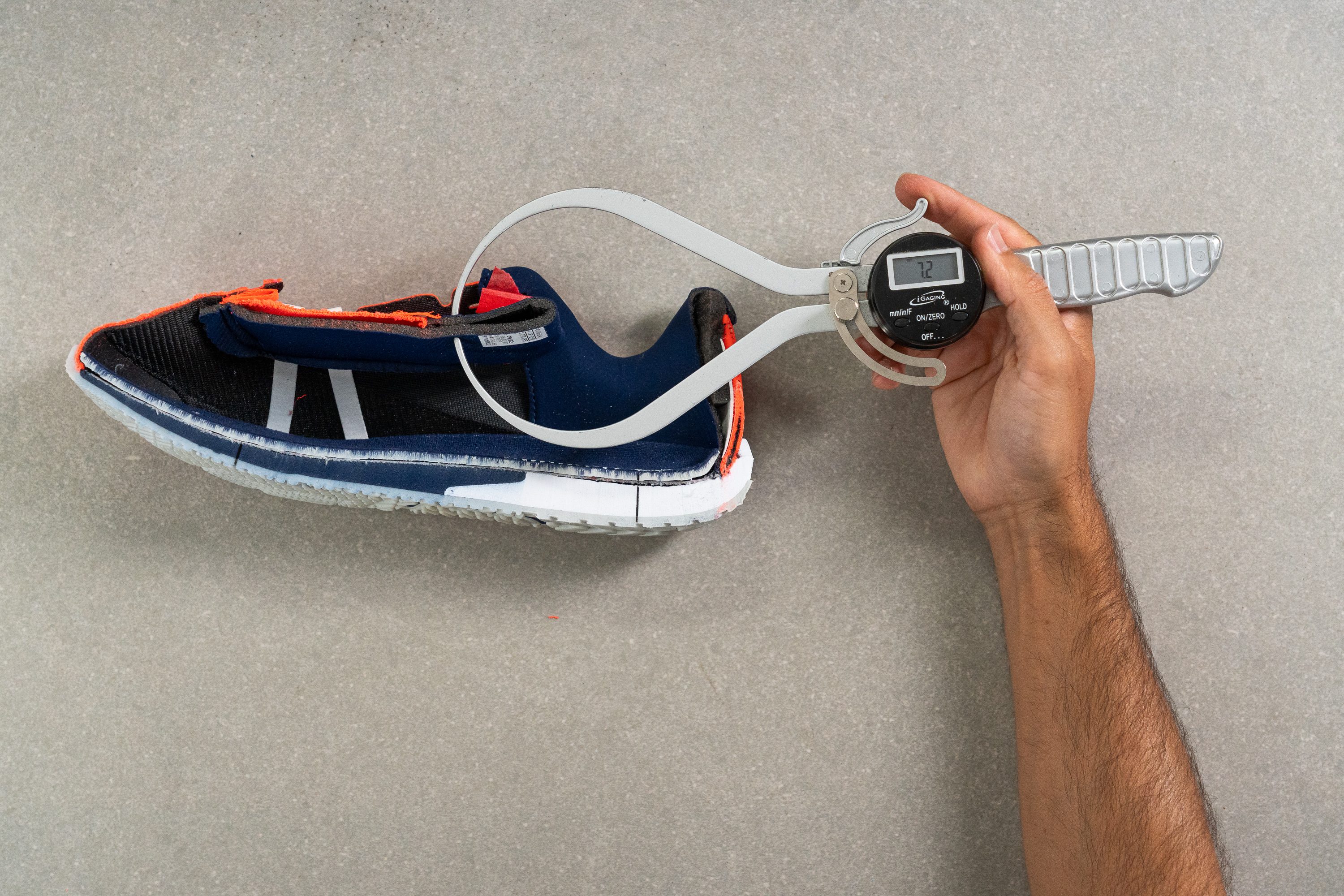
| Dropset Trainer | 7.2 mm |
| Average | 5.7 mm |
Heel tab
There is no heel tab on the Adidas Dropset Trainer but putting it on doesn't require a lot of effort either.
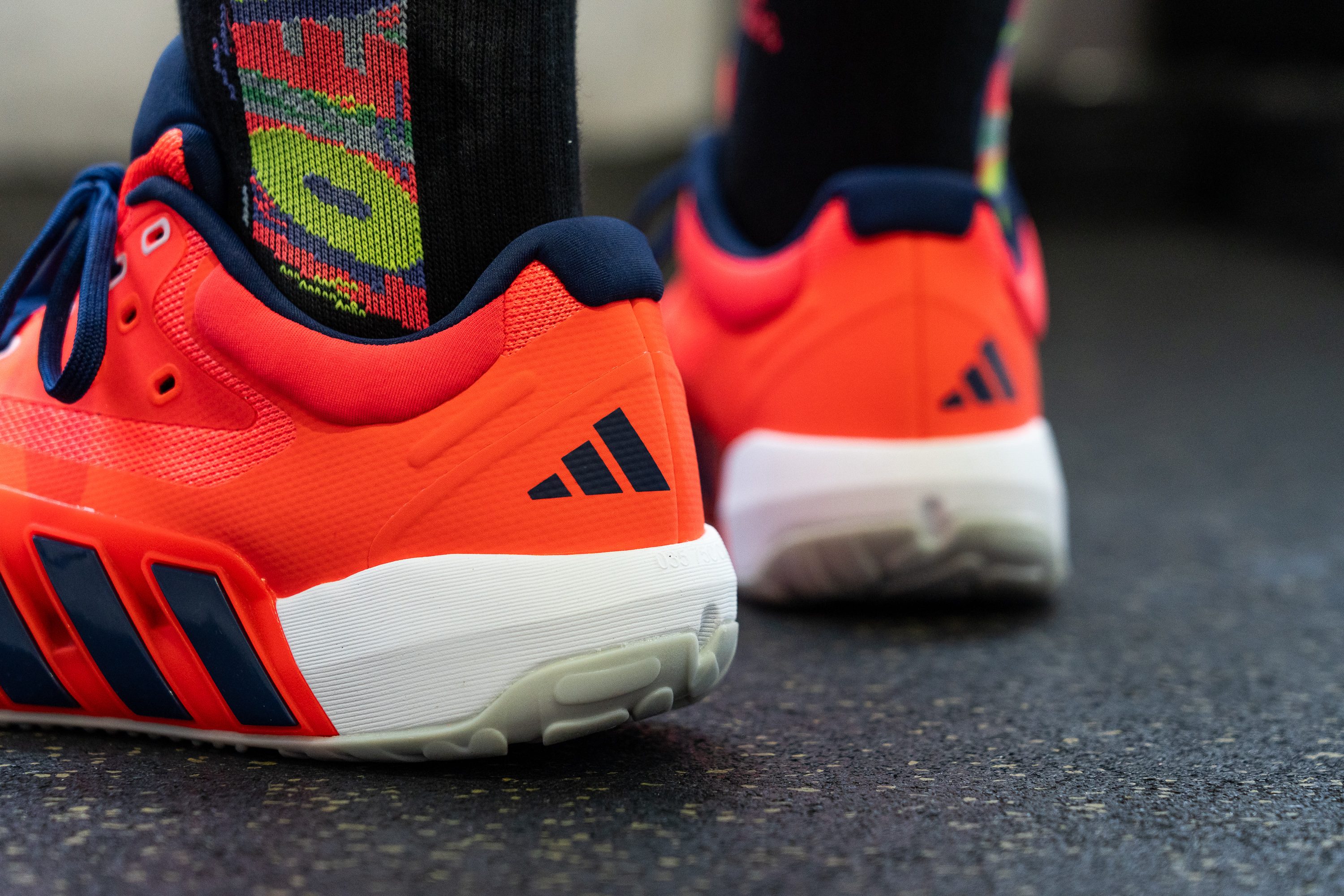
| Dropset Trainer | None |
Tongue: gusset type
This Adidas shoe has a conventional tongue which is non-gusseted and is not attached on the sides.
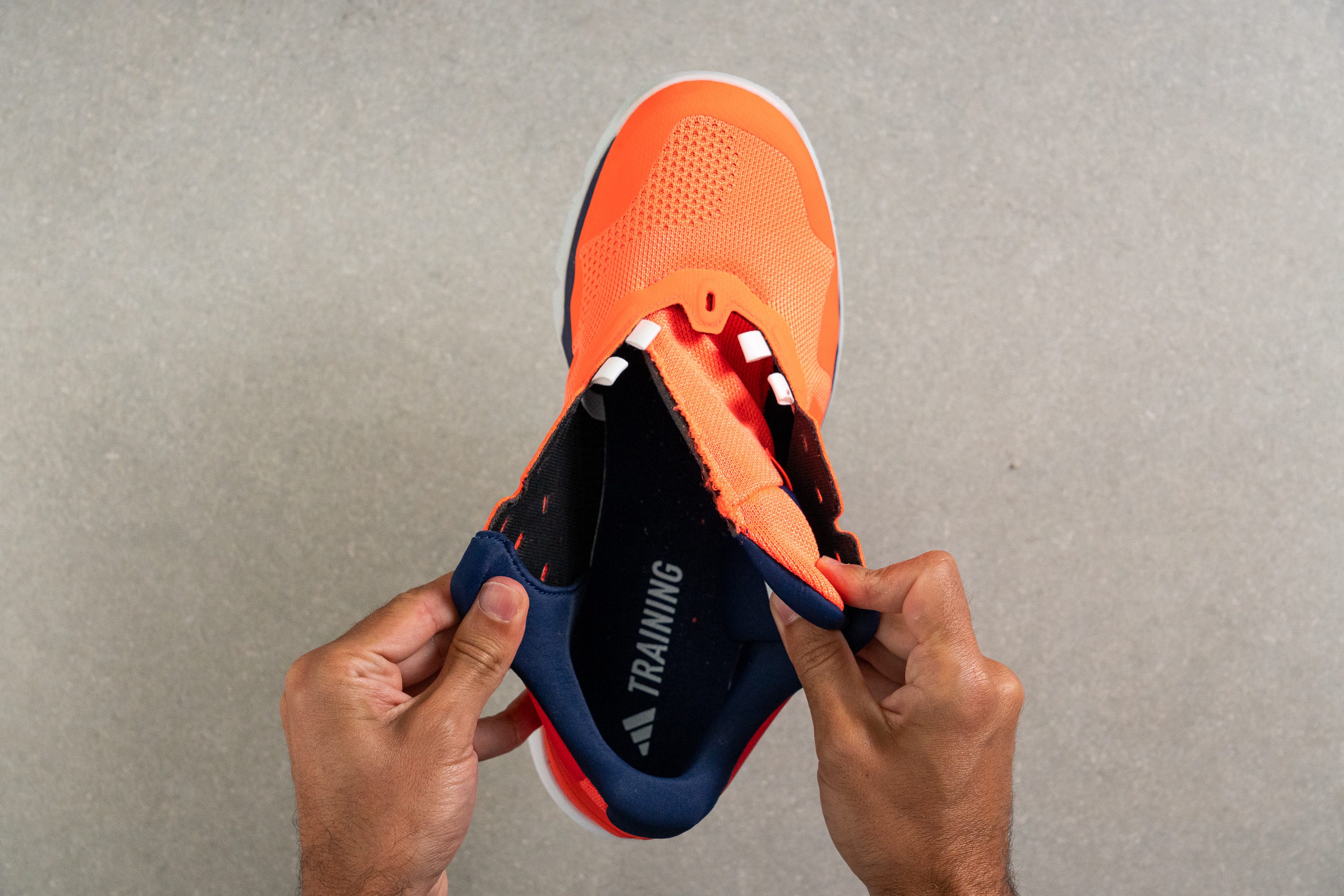
We didn't experience any issues with tongue sliding as the lacing creates a pretty locked-in feel. This is probably due to the highly customizable lacing system of this trainer.
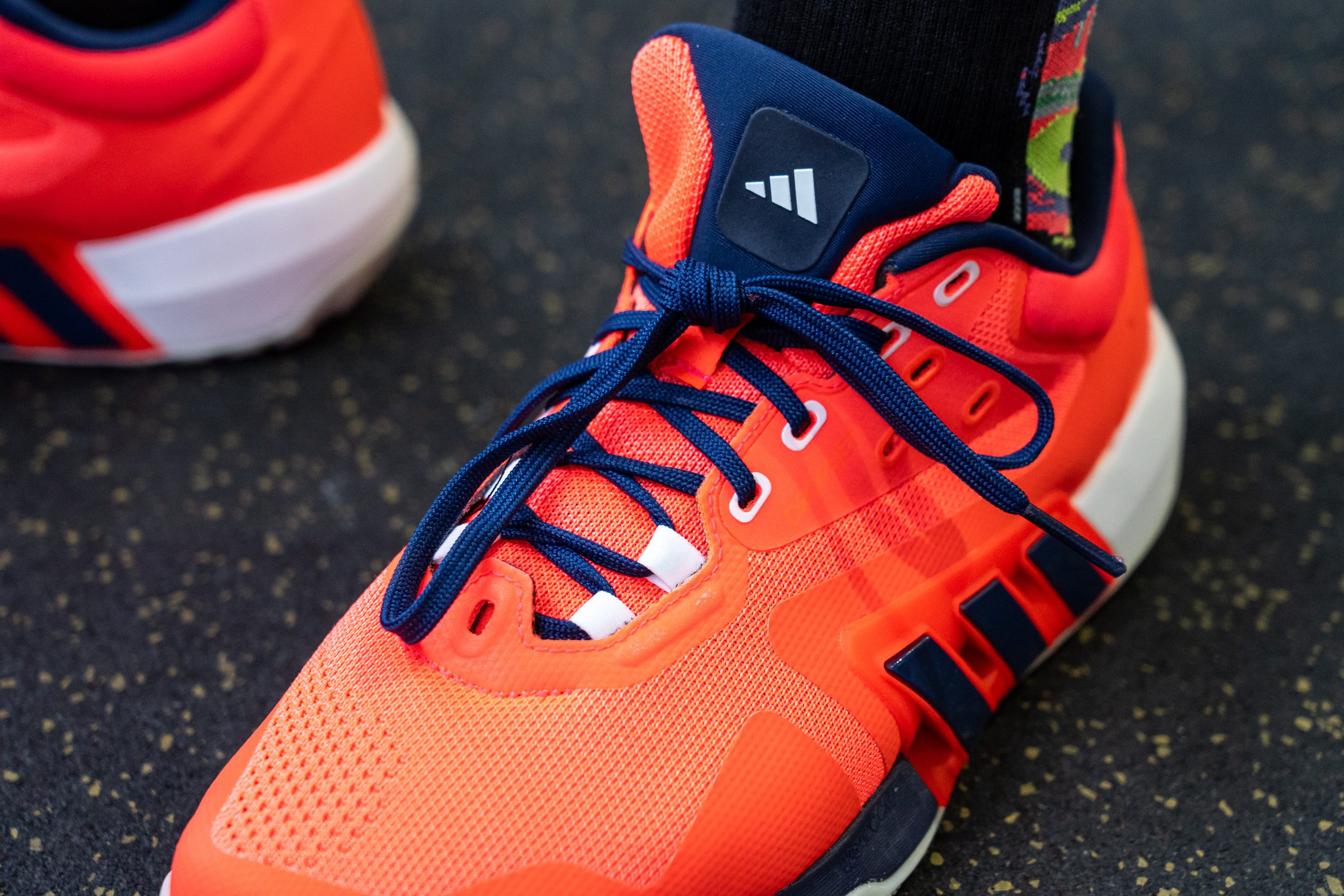
| Dropset Trainer | None |
Sustainable materials
Adidas states that the Dropset Trainer is made in part with recycled content. According to the product description, 50% of the upper is made of responsibly sourced materials.
